The inside story of Inter Milan’s victory over Barcelona, a Champions League tie that changed modern football
Long read: Inter Milan’s sensational two-legged victory over Barcelona in the 2009/10 Champions League semi-finals was a historically compelling clash between one philosophy on the rise and another on the decline
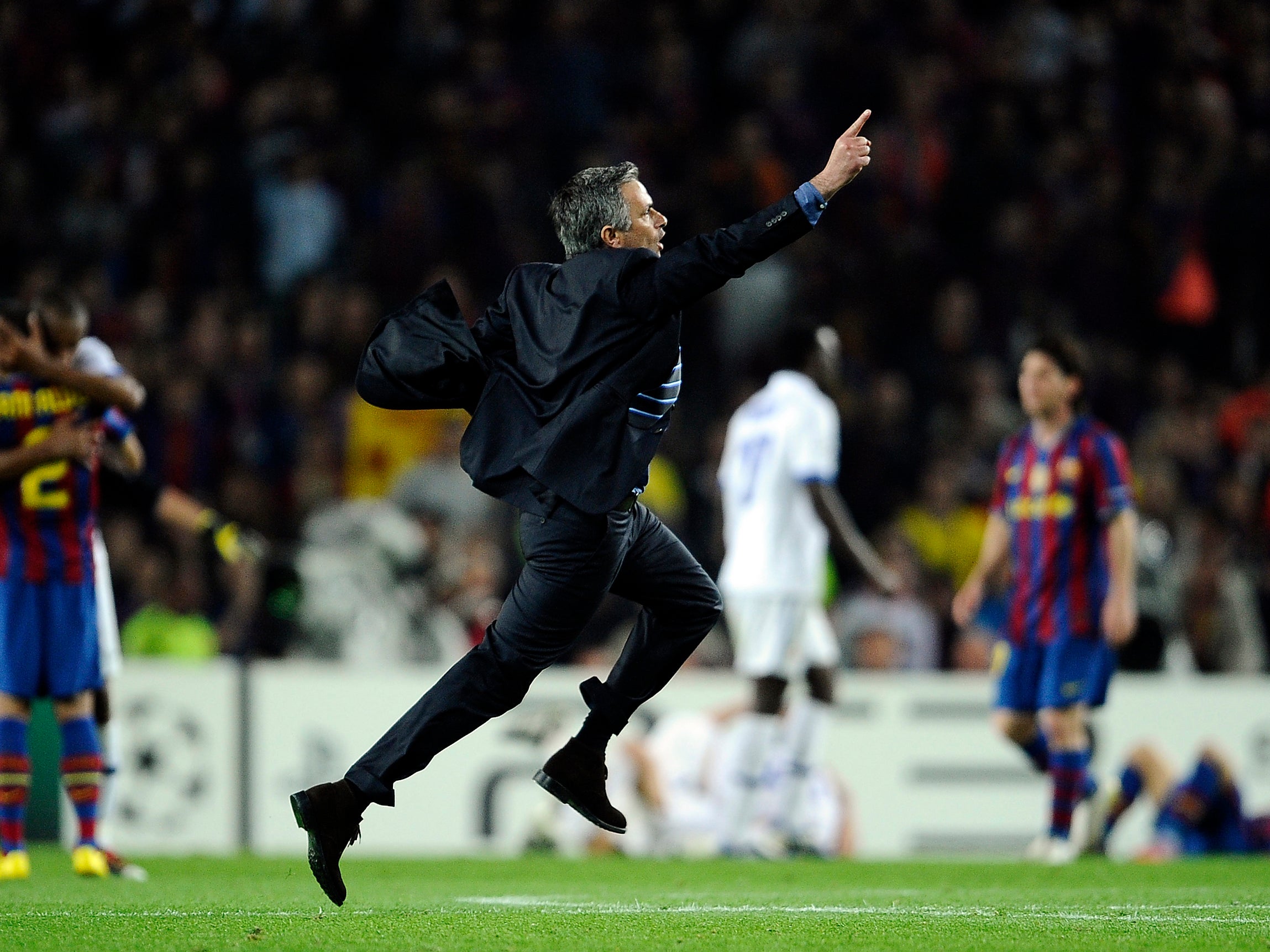
It is something that many have previously suggested about that great Barcelona side of 2008 to 2012, but that Pedro Rodriguez now freely admits. Grandiose as that team’s legacy is – it could have been greater. There was a historic opportunity wasted.
“We should have won three in a row,” Pedro tells The Independent now. “For that prestige, to confirm ourselves as the best, to keep winning the Champions League like all the historic teams.”
One game sticks in the memory more than most. He 2009/10 semi-final against Inter Milan. Barcelona should have won the tie. Instead, they lost 3-2 on aggregate.
“I don’t know how we lost,” Pedro wonders. “It was one of my worst days as a Barca player.”
But for Jose Mourinho and Inter it was their greatest day. It was the tie that ensured the Italian club’s only treble – and their first European Cup in 45 years – in turn breaking a huge “psychological barrier”.

This was the power of Mourinho at that point. This was also the feat he personally preferred above all others. It was not just that he’d beaten “the best team in the world”, but the comprehensive and multi-faceted manner of it, as well as the way everything he had said and planned came to pass.
There was even a moment in the first leg where Mourinho surveyed the utter chaos his tactics were causing in this supposedly perfect Barcelona and felt a total satisfaction.
There was also the fact he had predicted this. At half-time of that game, with his players having just fought back from Pedro’s opening goal for Wesley Sneijder to equalise, Mourinho told them the game had definitively changed. He assured them that, if they continued applying the counter-attacking game they were by then completely in-tune with, they would win 4-1 or 5-1.
They only won 3-1 in the end, but the comprehensive nature of the victory convinced the Inter players of his genius, confirmed him as a man of destiny. Such perceived clairvoyance matters in football because it fosters the kind of deluded self-belief required for sporting defiance. It was that belief which set the searing intensity required for the second leg at Camp Nou.
Mourinho would say his players “shed blood”. Maicon literally lost teeth.
Little wonder that one source tells The Independent that this was when Mourinho “thought he was God”, and could do no wrong.
He could do no right by Barca. Referencing one of his many jabs at his former club over the years – in this case about diving – the Camp Nou crowd chanted ahead of the second leg: “Mourinho, go to the theatre.”
The stage was thus set for the greatest of dramas. Mourinho himself said it was like “a great movie”. Pedro, and pretty much everyone else, acknowledges it was an “epic”.
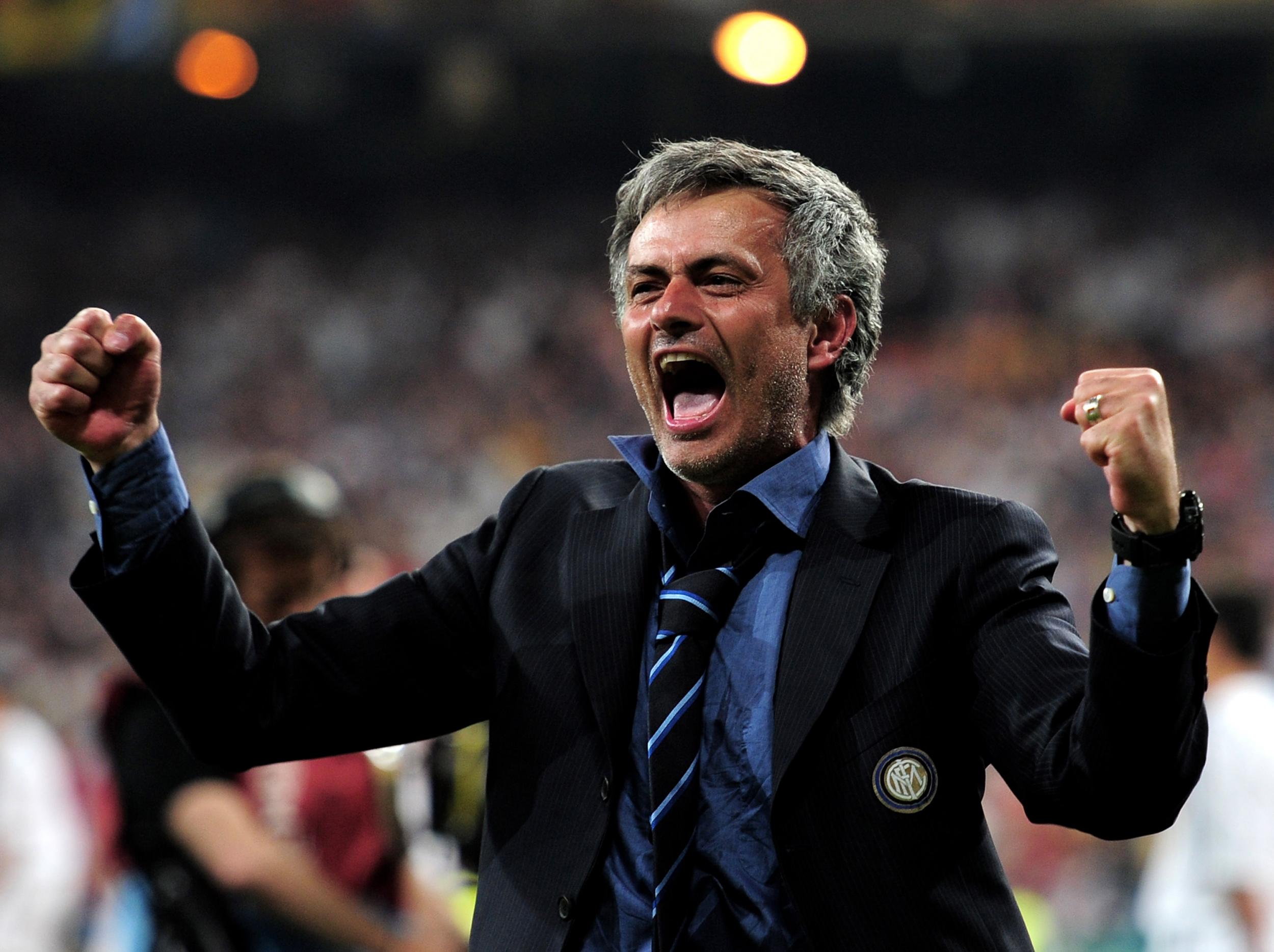
It was a tie for the ages, and as such one of those that so totally involved you in the moment. Through that, it was perhaps the first modern Champions League semi-final, one of the “true finals” that set the tone for these now regular clashes of super-clubs where the extreme concentration of talent demanded such concentration of attention.
You could not turn away.
As befitting all fine drama, it also had eternal themes. A clash of grand philosophies. Principles being compromised. Great all-time displays. Moments that rippled through history. Quests for holy grails. Personal journeys. Revenge. And a lot of long-term influence.
Mourinho would say his team getting through the second leg was “a miracle”, and afterwards gave thanks in the Camp Nou’s famous chapel. In fact, an act of God did shape the entire tie. The Eyjafjallajökull volcano erupted in Iceland on 20 March 2010, closing European airspace.
That ensured the tie would start with Barcelona travelling over 1,000km by bus. It ended with Mourinho parking “the airbus”.
“And it worked,” he later said with a smile.
This was the driving force of the tie, and the season: stopping Barcelona, whose eruption under Pep Guardiola had far greater consequences than the volcano.
Barcelona had exploded European football open and changed it forever. They changed the parameters of what was considered possible. Although Guardiola’s teams have since set new standards for super-clubs, their excellence – and general points return – was at that point unprecedented. Over two years the defending European champions had not lost a game by more than two goals, of the few they’d lost at all. The question that defined the season was whether they could tactically be bested at all.

That was because of what now looks like one of the most inspired and influential decisions in football history, and one that also involved the rejection that would give the tie its spark.
In early 2008, the Barcelona hierarchy – principally Ferran Soriano, Txiki Begiristain and Marc Ingla – were appointing a successor to the jaded Frank Rijkaard. It came down to a straight choice. On one side, there was their own B-team manager in Guardiola, who’d been in the profession less than a year. On the other, there was Mourinho, the most successful in the game.
In the end, they went with what was obvious to them. Looking to revitalise the club, the hierarchy felt they had to go to “an extreme, our real essence… and take Guardiola”.
That was what Mourinho took such offence to. The Portuguese has had a habit of turning against clubs who turned him down, but that was never as pronounced as with Barcelona due to his history there.
“He is a bit poisoned by the fact that he was rejected,” Ingla told Graham Hunter.
That single decision would set in place so many of the pieces for this tie, and of course set Mourinho on the path to Inter. His career ambition was to win league titles in four different countries, and the Champions League with three different clubs. Here was one of the great clubs offering a defined route and desperate for his European expertise.
Mourinho went on to build a team in his mental image, which was players with a point to prove; professionals in their prime desperate to finally win the Champions League. This was the key to the emotional intensity the Portuguese demanded. This was one of the keys to the season. “It was a team with desire, that knew what it wanted,” says Diego Milito, one of nine players who started the second leg against Barcelona over the age of 28. “Very good players, technically and tactically very intelligent.”
Mourinho would describe it as “a strong, cynical, intelligent, pragmatic team”. Exactly of the mature type he idealised.
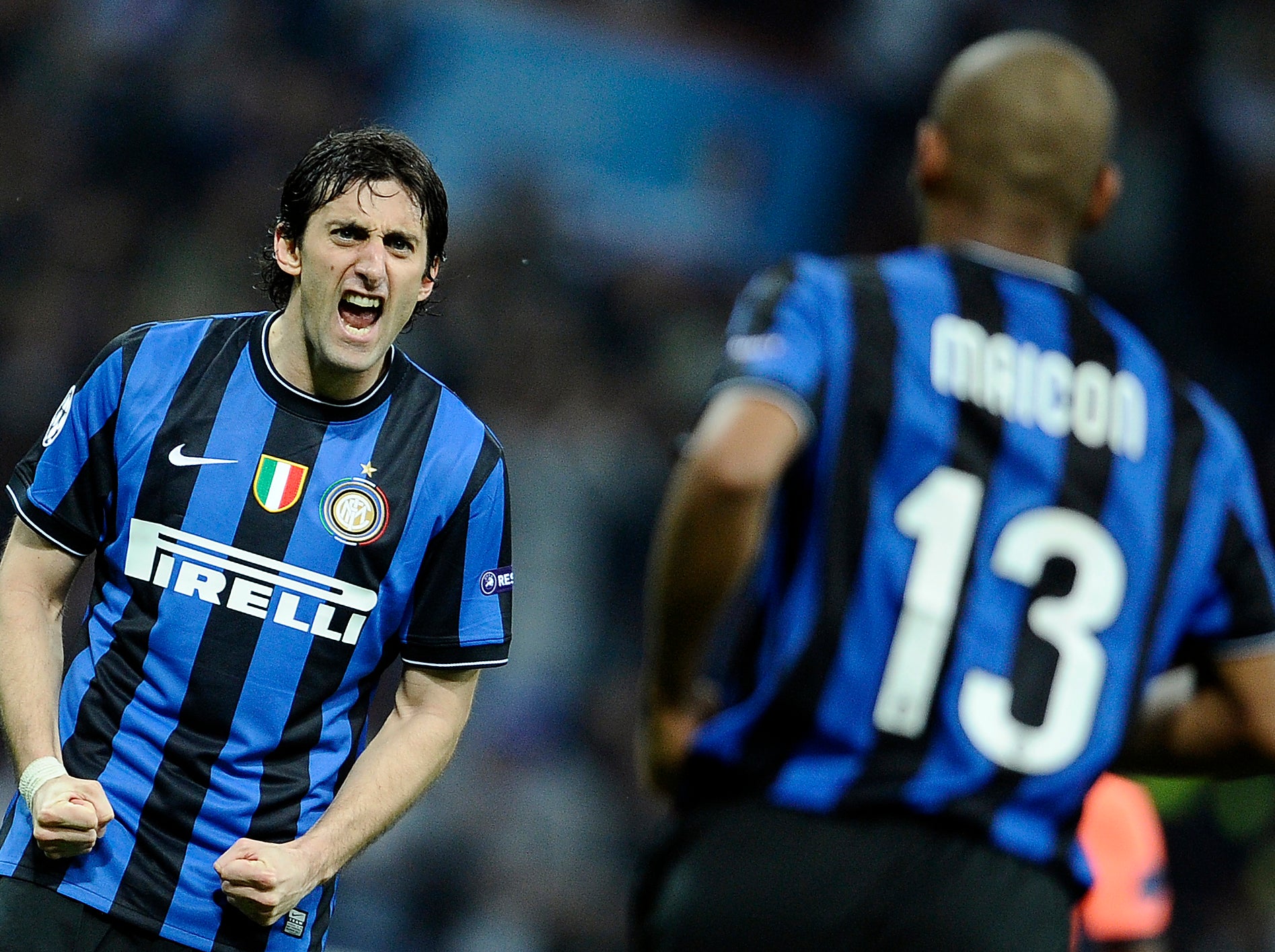
Inter did develop “a sense of destiny” over that season, first defined in the signature Mourinho performance that was the last-16 win over Chelsea. All of Wesley Sneijder, Walter Samuel and Esteban Cambiasso had been discarded by Real Madrid, in whose Bernabeu stadium the 2010 final would be held.
There was then the highly fired-up Samuel Eto’o, himself discarded from Barcelona’s treble winning team by Guardiola because of “a feeling”. That move was at the core of another sub-plot, given it facilitated the transfer of Zlatan Ibrahimovic.
The Swede – quite literally – stood at the centre of this, given the issues that were to come. Ibrahimovic had wanted out of Inter as he had come to the conclusion he “was never going to win the Champions League” there.
“I didn’t think the team were good enough,” he would later admit.
The high price of his transfer inadvertently helped change that and he instead became the reason Guardiola felt Barcelona ultimately failed to win the Champions League that season.
“I put a star player before my own game plan, thinking about the €60m he had cost us instead of following through on my own ideas,” the Catalan told Marti Perarnau in Pep Confidential. Inter president Massimo Moratti had insisted on that price, so that it would be greater than the fee AC Milan received from Real Madrid from Kaka, one of the moves that forced Sneijder out of the club. It was quite the cost.
It was also quite the turn. Ibrahimovic had actually started the season well, in a period that saw Guardiola and Mourinho face off for the first time ever. It was a tepid 0-0 draw at the San Siro to open the Champions League, and an entirely phoney war beyond the angry response to the Swede.
Barca would beat Inter 2-0 in their genuinely important next group match, albeit with Ibrahimovic on the bench. Even Mourinho was forced to pay homage to their “spectacular football” that night.
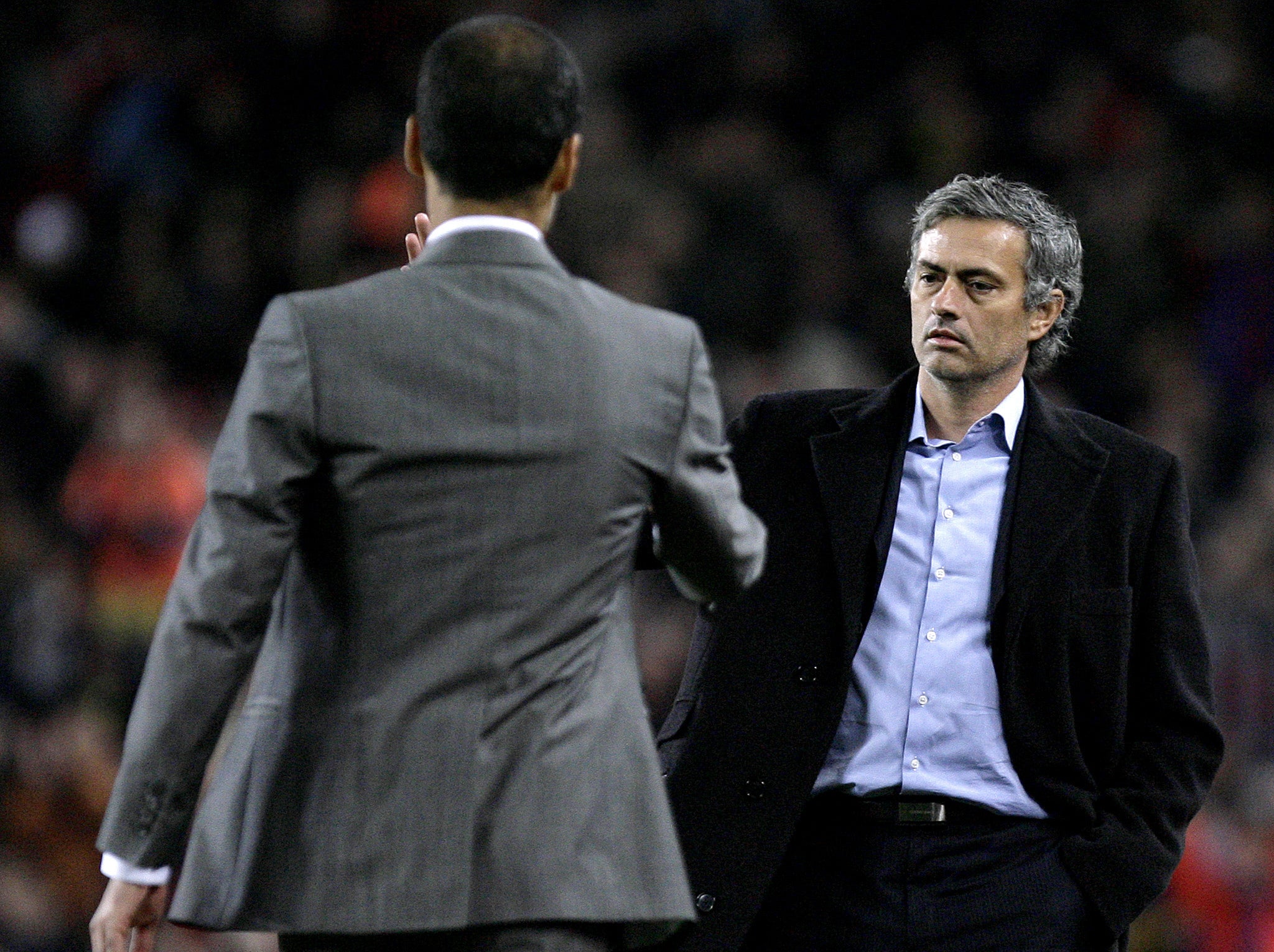
That would be instructive for him, enriching the bigger games to come. It became apparent Ibrahimovic just did not get Guardiola’s way of playing. He didn’t get out of the way, either, as he so often just obstructed their passing and the movement of Leo Messi.
Guardiola was already considering dropping him when the Swede got injured. With Messi moved to false nine, Barca won the crucial April Clasico against Real Madrid 2-0 – even without the injured Andres Iniesta. That would effectively seal the destination of the title, but the discussion would shape some of the path to the Champions League.
Before that, though, there was the actual 1,060km path to Milan. Barca held out hope until the last possible moment of being able to fly, even if it was from Nice to Milan.
They were eventually resigned to setting off from their Ciutat Esportiva base at 2.43pm on the Monday morning before the Wednesday game.
Uefa never considering suspending the match.
Some players couldn’t believe this was the solution. Others know it was one of those things. All had to lump it. On the eight-hour first part of the journey, the squad messaged former teammate Eidur Gudjohnsen joking about his country’s volcano, and watched ‘Invictus’ as well as ‘Inglorious Basterds’. They arrived at Hotel Martinez de Cannes at 10.55pm, before setting off again at 10am the next morning. Airspace had still not opened, so the journey finally came to a close at 2.20pm the next day, at Hotel Melia Milano.
Zlatan described it as a “disaster” and others said they felt fatigued. But Bojan Krkic now insists to The Independent it was “not the reason we lost”.
There were certainly other major factors. One was what was happening while Barca were travelling. Mourinho was already thinking deeply and rigorously preparing his players for an intricate two-part plan.
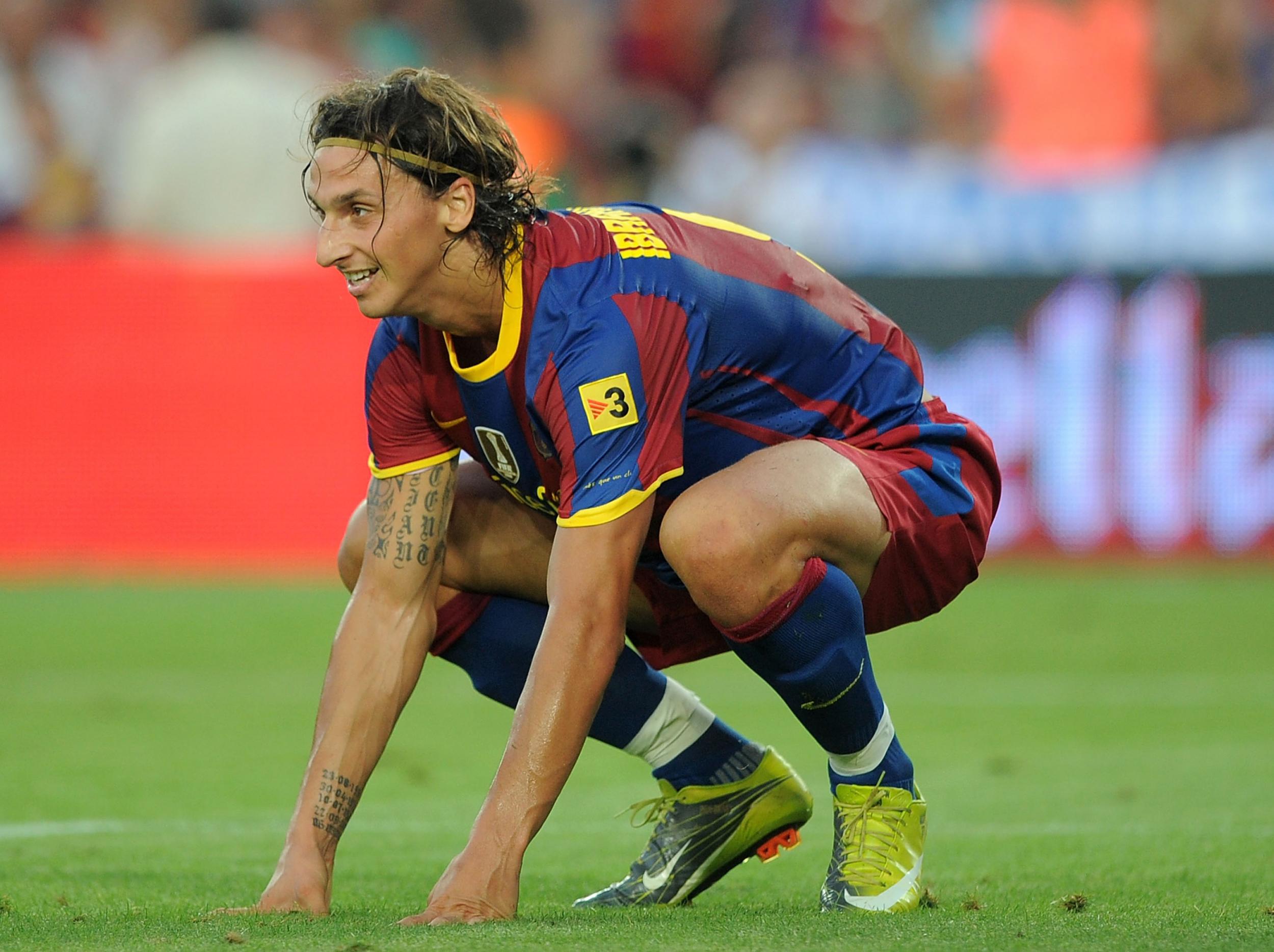
What most occupied his mind was the first part of that plan, which was – of course – how to inhibit Messi. Mourinho was fixated on it.
“Every time I played against Messi, I spent hours studying him,” Mourinho told a few journalists at Chelsea in 2015. “It is not about stopping him but giving him a difficult match. That is the best you do against him.”
That was because of the particularly explosive problem Messi’s mercury-like movement posed. Mourinho needed his side to be “compact” around the box and limit all space there to also minimise the effect of Barcelona’s inevitable possession. But there was one obvious – but almost unstoppable – way in which Barcelona would be able to prevent this defensive plot.
It involved Dani Alves darting down the right and Messi cutting inside, to send defenders scrambling in both directions. The usual counter-measure would be for the opposing centre-halves and central midfielders to pass the responsibility for the Argentine on to the next player, but what prevented this was when one of the other Barca attackers would press and draw one of those defenders.
This was when the fatal gap would appear. And this was when Messi was lethal and one of his most underappreciated talents would come alive. He possessed the lateral vision to spot and then dart into that gap in an instant, thereafter using his talent to fully exploit it.
Minimal opening, maximum effect.
Any time you see Messi apparently standing idle and detached from a game, this is what he’s doing. He is sizing the game up and instantaneously analysing exactly where the fracture points in a team’s defensive framework are.
Mourinho, however, arrived at a similar moment of “clarity”. He devised a four-man gabbia – Italian for jail – for Messi that would constantly restrict where he could move. It required a certain risk, given the freedom it would allow other Barcelona players, as well as full concentration.
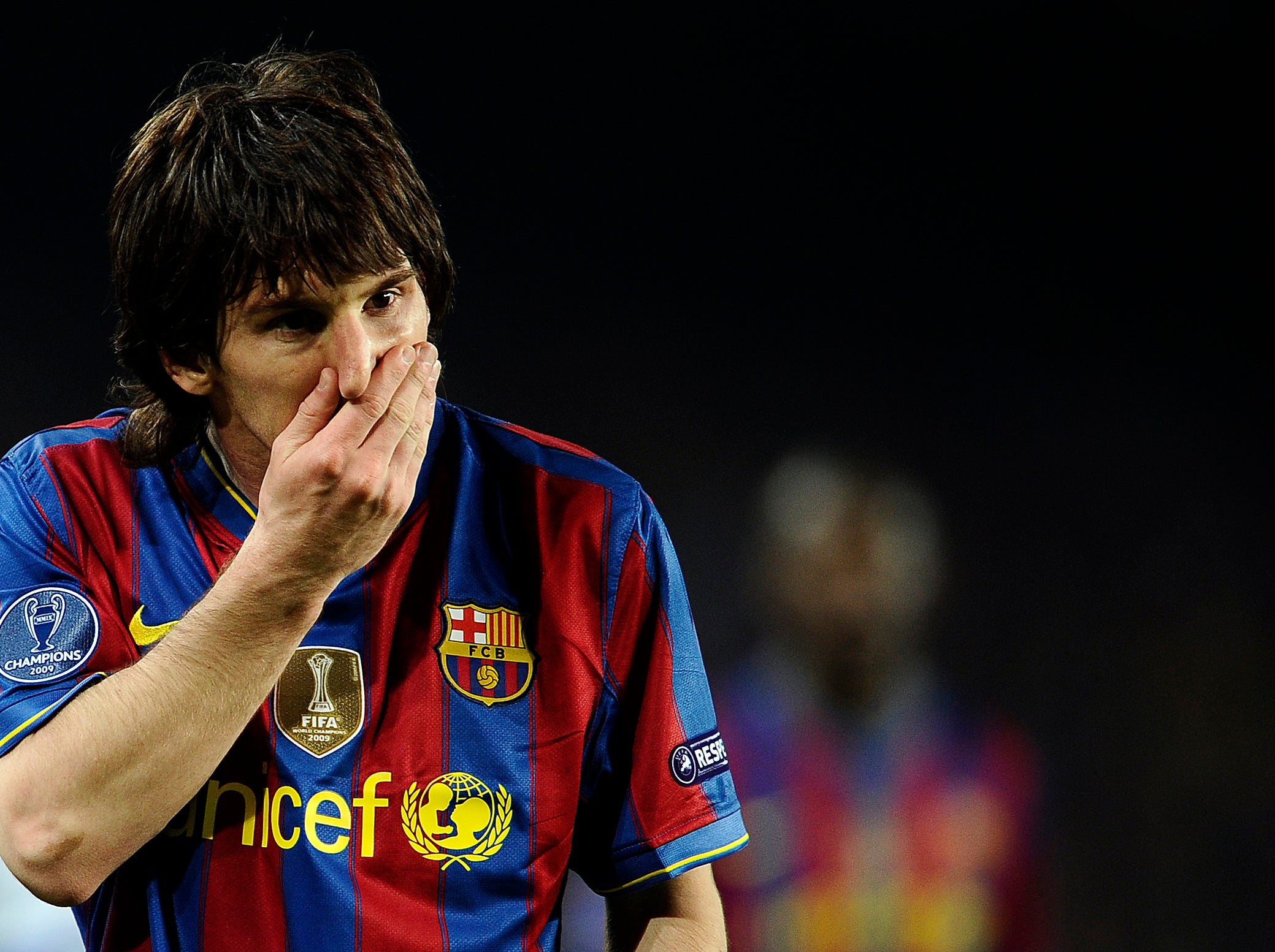
This was where the emotional intensity Mourinho engendered fully came in.
“He gave us information nobody else could give us,” Sneijder told Champions magazine in 2010. “That is the power of Mourinho.”
It still wasn’t the full plan. The second part was arguably even more difficult, since it necessitated attack without weakening that defence.
“We knew we’d have no chance in the second game if we didn’t win at home,” Mourinho said. So he had to find that balance. It again came down to timing.
“Obviously the strategy to try to hurt them was in our attacking transition, the moment we recover the ball,” Mourinho later explained in an enlightening Coaches’ Voice video. “And we know of course the way of their building-up, going with Alves and Maxwell forward really, really wide and leaving lots of spaces.”
Inter would thereby wait for the ball to go to the side – and then pounce with full force.
“We were fundamentally going from a defensive low block but going very, very strong with three, four, five players into attacking positions in the transition.”
It all required an immense amount of concentration, patience and discipline to avoid – as Javier Zanetti put it – the “siren call of the ball”. It was then little wonder Mourinho said in the pre-match press conference it would be “a game played with the head more than the feet”.
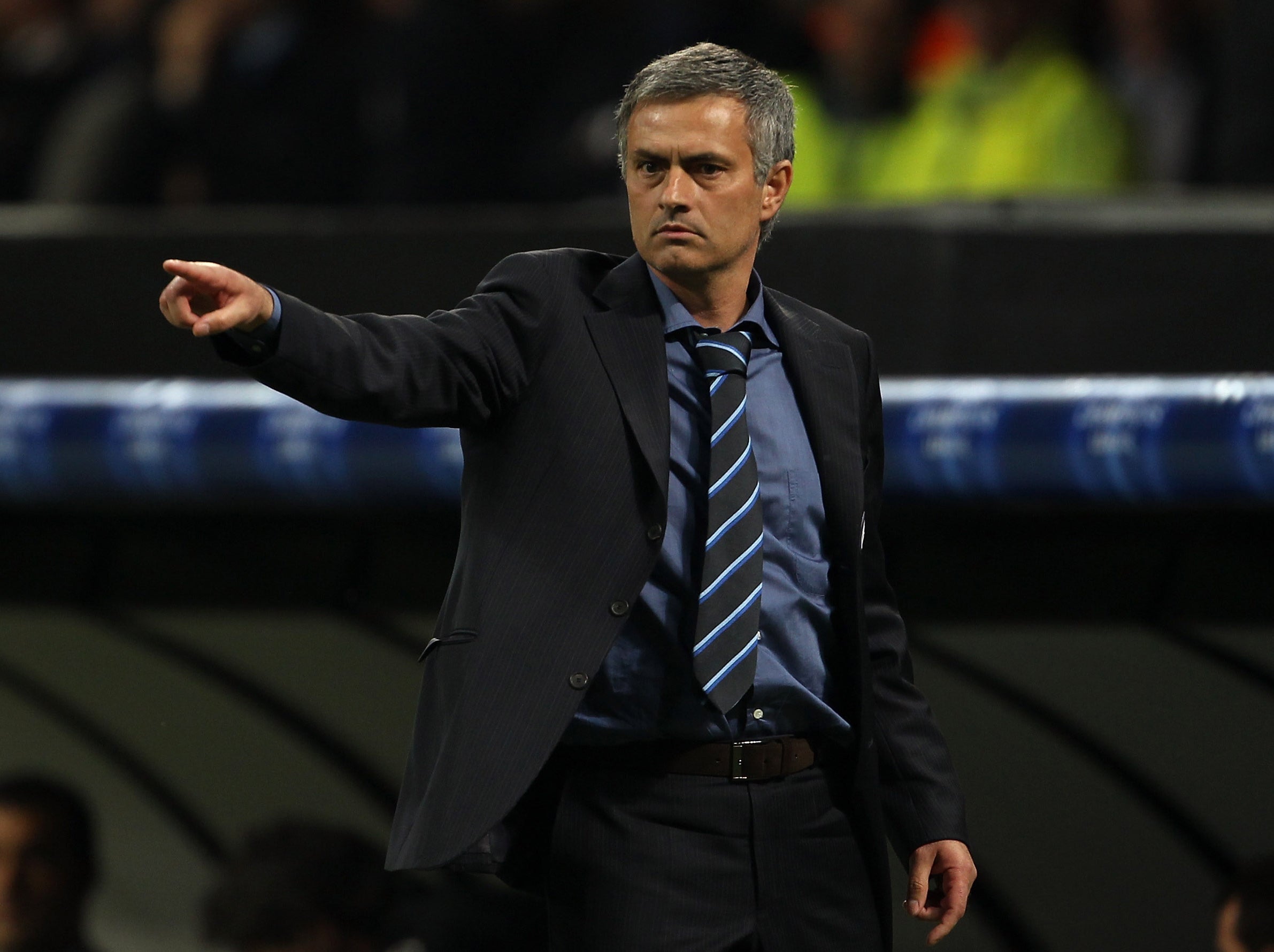
Little wonder the pre-match tactical talk was split over two days, so the players could fully register it. This was what playing Barcelona involved.
This is why, any time anyone asks Mourinho about the epic second leg of this tie, he instantly snaps back: “I prefer the first.”
Guardiola being Guardiola, he spent just as much time running the possibilities for the game over and over in his head.
Those close to him say he knew he should have dropped the just-returned Ibrahimovic. All the evidence was there, especially from the wins over Inter in the group stage and then Madrid.
Ibrahmovic revealed in his autobiography t was almost like Guardiola was probing him for an excuse during the last training session.
“Can you play from the first whistle?” he asked. “Are you ready? But are you ready?”
Guardiola decided to stick rather than twist, and it left Barca’s frontline so much more static.
This was evident from the first whistle. And particularly the first attack.
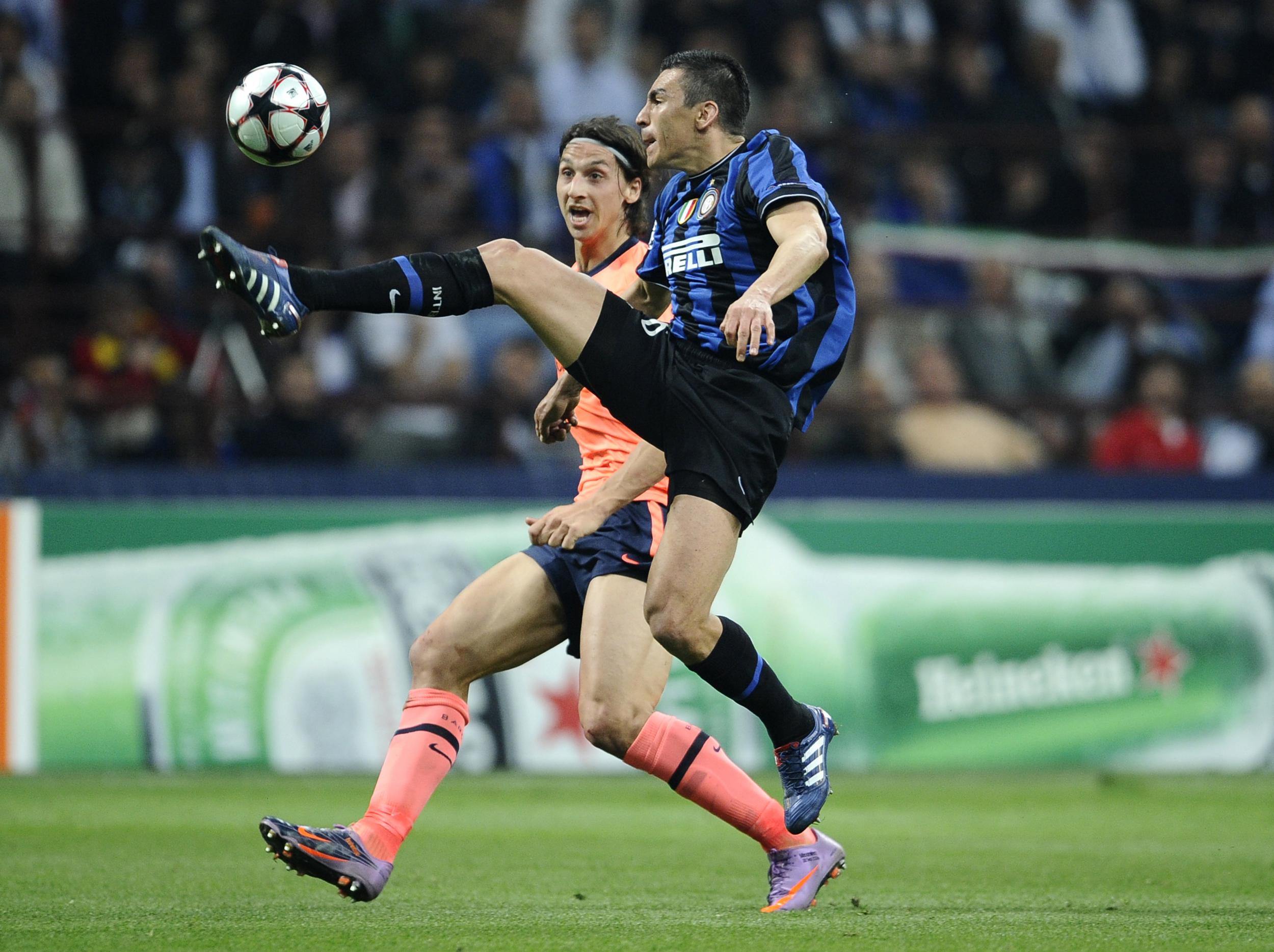
Right in the centre of a San Siro Stadium soundtracked by that soaring and screeching noise you only hear for the highest-profile games, Maxwell escaped down the left and crossed for Ibrahimovic. It was a rare moment when he got free of Lucio and Walter Samuel but, rather than head it, the Swede went for one of those idiosyncratic aerial back heels.
It was an unnatural move, and seemed self-indulgent, if also inevitably stilted.
It reflected the display. Having Ibrahimovic at the centre inhibited everything that Barcelona usually did so well. The ball was repeatedly played both to the feet and heads of Lucio and Samuel, with Xavi forced to play specific types of pass, which in turn forced Messi out of where he played best.
That made it easier for Inter to execute the first part of that plan.
The tie came down to Guardiola getting it wrong as much as Mourinho getting it right. Similarly telling was that Barcelona’s solitary goal came without Ibrahimovic touching the ball. It did come from one of Maicon’s “trigger” runs forward, though, emphasising just how difficult Inter’s balancing act was.
A space was opened, Maxwell cut back, and Pedro scored. It was a crucial away goal, and now exactly the situation that perfectly suited Barcelona.
It could have been fatal, especially given Inter’s three defensive errors that led to Pedro’s shot. They were among the last they would make.
Mourinho had warned them of this. He’d spoken about it so much the players knew not to panic. They stuck to the plan.
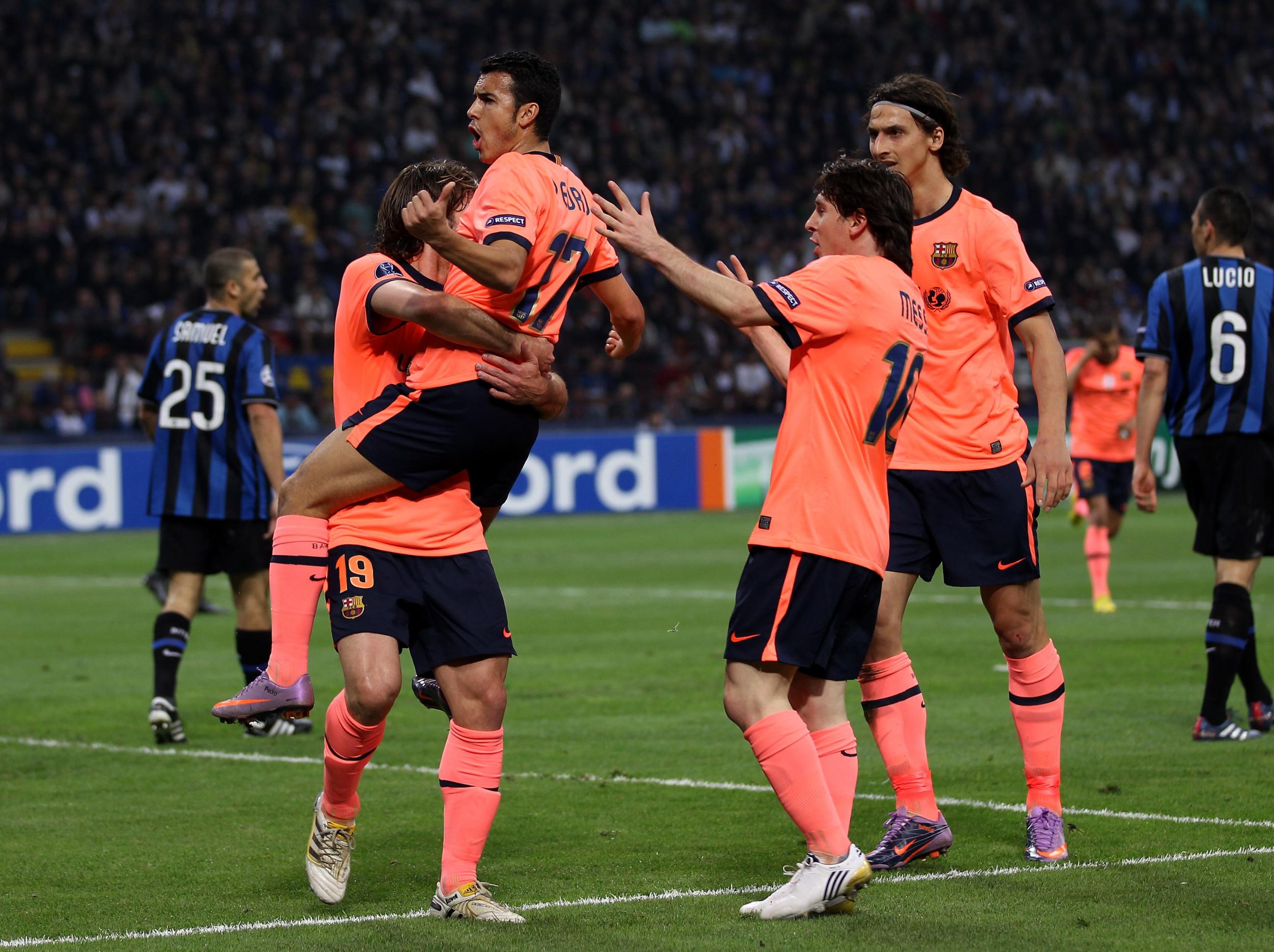
“Nothing changed when they went ahead,” Sneijder said.
The gameplan, however, began to change the game.
Inter began to create more chances. Diego Milito had two of them, snatching badly wide at the second in the 27th minute.
Like so many Inter players, though, he didn’t let such mishaps cow him. His persistence and work rate were a key part of the victory, as was almost immediately displayed.
A mere minute later, Eto’o found Milito in the centre. The Argentine drew three defenders and, with supreme presence of mind, slipped the ball out for Sneijder to finish.
The San Siro came alive again. Inter were back in the tie. But there was more to it than that. Mourinho’s plan had become visibly concrete. They now had full belief in it to go with their goal, emboldening everything they did.
Minutes later, Messi tried to cut inside, only to be shepherded well by Samuel before Esteban Cambiasso went in strong.
This was the jail, on full lockdown.
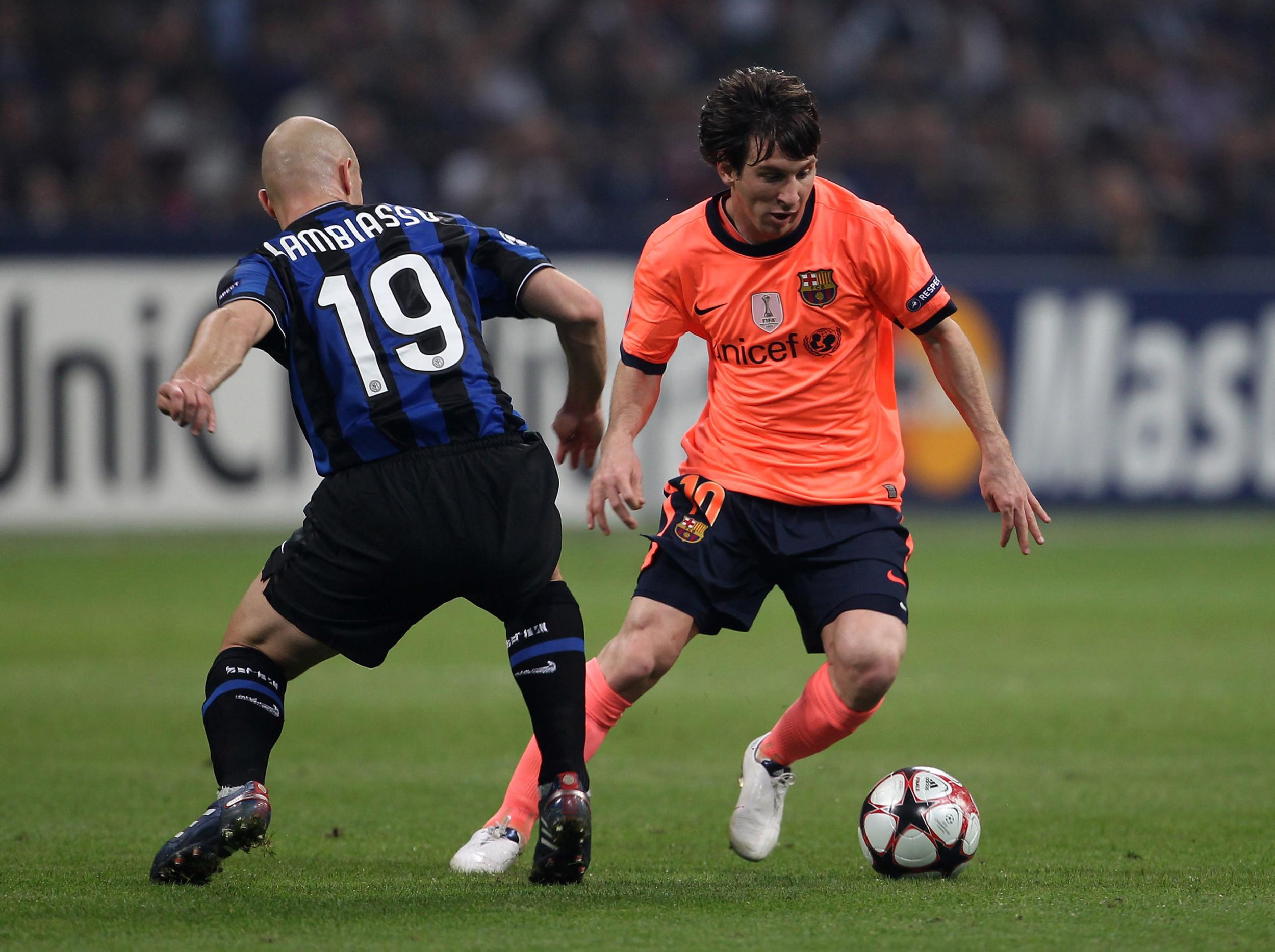
This was why Mourinho was so convinced his plan would win it.
It still needed execution, though, and no one executed it as fully as Maicon. Mourinho later described him as “a physical marvel”, and while there were so many players key to applying that plan, it was Maicon’s running that connected the two parts.
Fired up by his manager’s half-time talk, the Brazilian burst up the pitch in the 47th minute, after another moment when Messi was aggressively dispossessed. The ball was played out to Milito on the right, who squared it to the onrushing Maicon. He eventually forced it past Victor Valdes, Seydou Keita stumbling to the ground in his slipstream.
It was “exactly” what Mourinho envisaged. The third goal was much the same but even cleaner.
A lightning counter led to Eto’o clipping the ball to the right, Sneijder heading it back from the left, and Milito finishing from close range. It was just reward for the Argentine. It was just the best of Mourinho: assured defending fused with ruthlessly cutting counter-attack, thanks to forensic tactical planning and fierce motivation.
Against that, there was only chaos within the Barca side. It was symbolised by the image of their players falling to the ground as Inter scored. It was what Mourinho took such satisfaction from. Barca “couldn’t cope with this”, he told Coaches’ Voice.
Inter did get the benefit of more fortune, as replays showed Milito was marginally offside.
Even allowing for that, it’s still difficult to overstate just how stunning this was. It was the first time Guardiola’s Barca had been made look fallible, let alone to this extent.
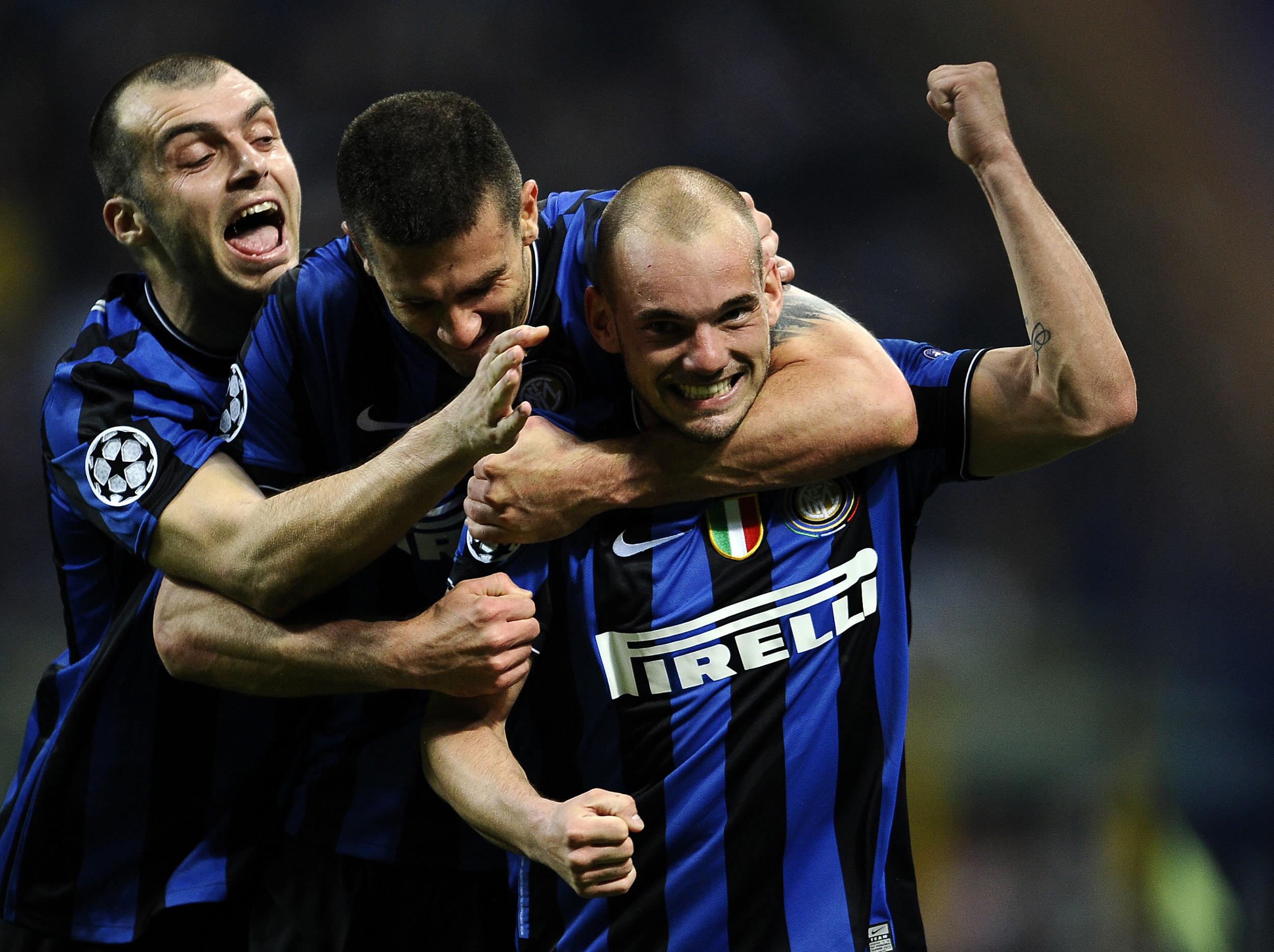
Guardiola himself, meanwhile, had seen enough. Ibrahimovic was instantly hauled off, having ran the same distance as Valdes.
Barcelona quickly improved, although some of that was down to the natural state of the game. It became what was more widely expected beforehand, and the second leg was to completely become: Barca probing with possession, Inter defending defiantly – and occasionally desperately.
Dani Alves seemed to break through in the 83rd minute, only to be brought down by Sneijder. Portuguese referee Olegario Bequerenca took out a yellow card for diving rather than point to the spot – the ensuing row resulting in the yellow card for Carlos Puyol that would keep him out of the return. It lead to all manner of accusations in the Catalan press about the official’s “friendship” with Mourinho.
Guardiola did admit Inter were the better team and Barca were off their best, but couldn’t resist a dig. “If Messi’s shirt is grabbed three times, they score on the counter, there’s nothing I can do.”
He also complained that Inter wouldn’t let them water the pitch, “which was in a very bad state”.
In the tunnel, Xavi sarcastically asked Mourinho about the ref, only for Mourinho to snap back: “Which one are you asking me about, from the Chelsea game last year?”
Sources from the stadium say Xavi was irritated after it.
Mourinho, of course, ramped it all up when speaking to the press.
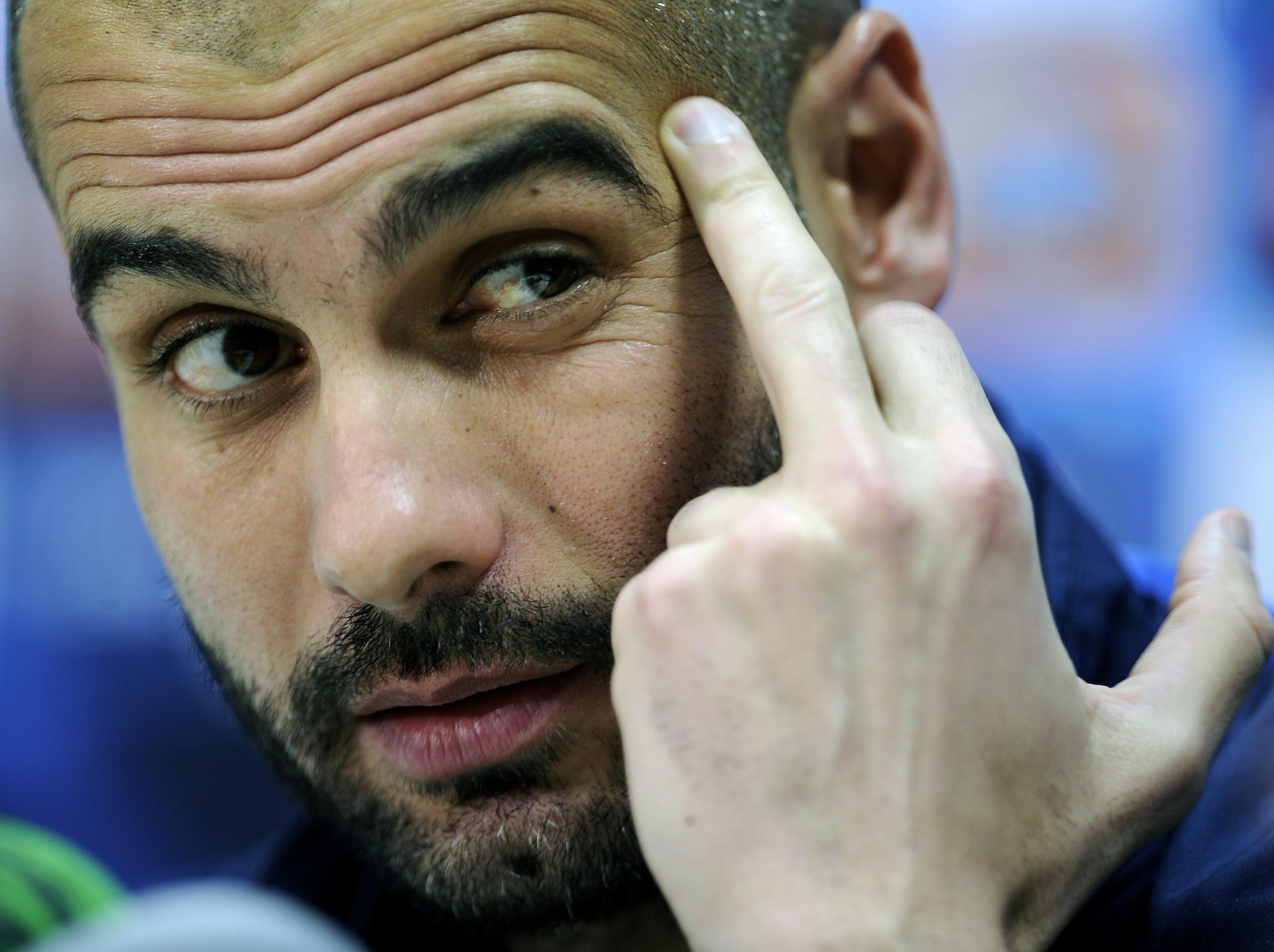
“It’s normal they get angry losing, because they’re not used to it. You can’t win it all. It’s not easy to accept it, but that’s football.”
Guardiola realised what Mourinho was doing. His players were animatedly angry about all of it in the dressing room afterwards, even if many feel that was as much down to their own sense of frustration. The Catalan told them not to be provoked.
Nevertheless, a spark was set. A tone was set. The greatest drama was still to come.
***
Over the next few days, Barcelona’s anger was focused. The word remontada – comeback – kept being repeated like a mantra, particularly by the late Tito Vilanova. The assistant was already saying it by the time they reached the boarding gate at Malpensa airport. Barca were by now able to fly, but wanted to run through walls – which was pretty much going to be called for.
After the next league match, a 3-1 win over Xerez, the players wore t-shirts proclaiming “we’ll play out of our skins.”
Guardiola meanwhile issued a call to arms for fans, declaring “now it’s time for Barca at their maximum”.
The refrain in the dressing room was “we’re going through, lads”.
“You could feel the atmosphere, and what it meant,” Bojan tells The Independent. Guardiola even had a motivational video prepared like the Gladiator one he used ahead of the 2009 Champions League final, but actually decided against showing it because of how fired up his squad were.
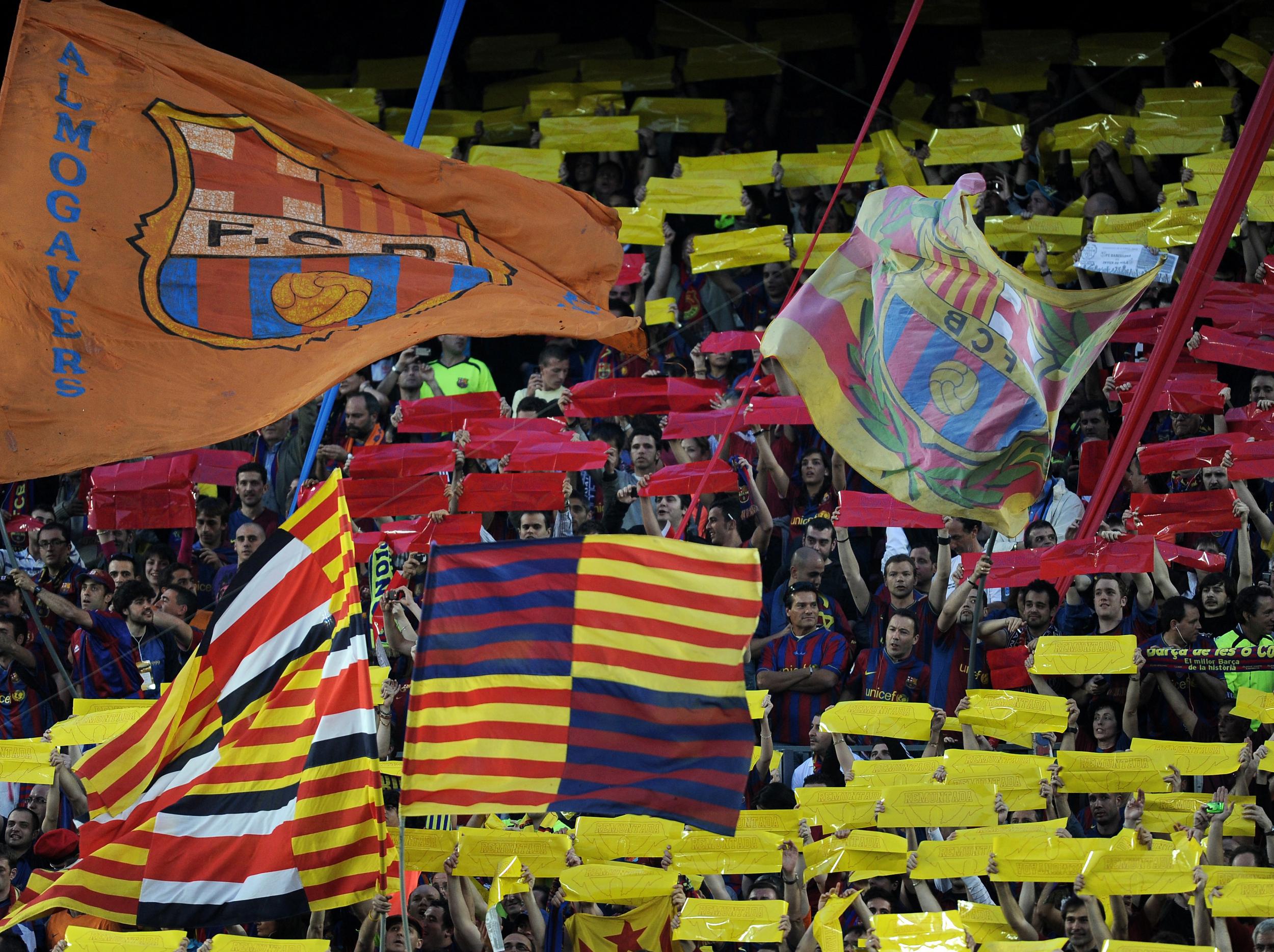
Gerard Pique perhaps summed it up. “I want the Inter players to hate their profession for 90 minutes.”
This was the wave Mourinho was preparing those players for. This is why he set about constructing the wall.
It was to be a game of extremes. If the first match was the ultimate showcase of Mourinho’s management, this was to be the ultimate clash of football fundamentals: all-out attack against all-out defence.
There was only one part to the Inter plan this time: just defend. Leave the ball, concentrate on the space.
It was much easier to explain, but still so difficult to execute.
Mourinho told his players to sit deep, only press within 25 yards of their own goal, and use strict zonal marking. It was going to take “blood”, and the most intense concentration, in the most intense of atmospheres.
Mourinho, of course, was only too happy to stoke that atmosphere. It was all part of the gameplan, as Guardiola realised. With Barca players actively talking about how a final in the Bernabeu was a “once in a lifetime opportunity”, the Portuguese played on this.
“We want to follow a dream,” Mourinho said. “But it’s one thing to follow a dream and another to follow an obsession. For Barcelona it’s an obsession… It’s an obsession you can see and feel.
“To have a Catalan flag in the Bernabéu is an obsession.”
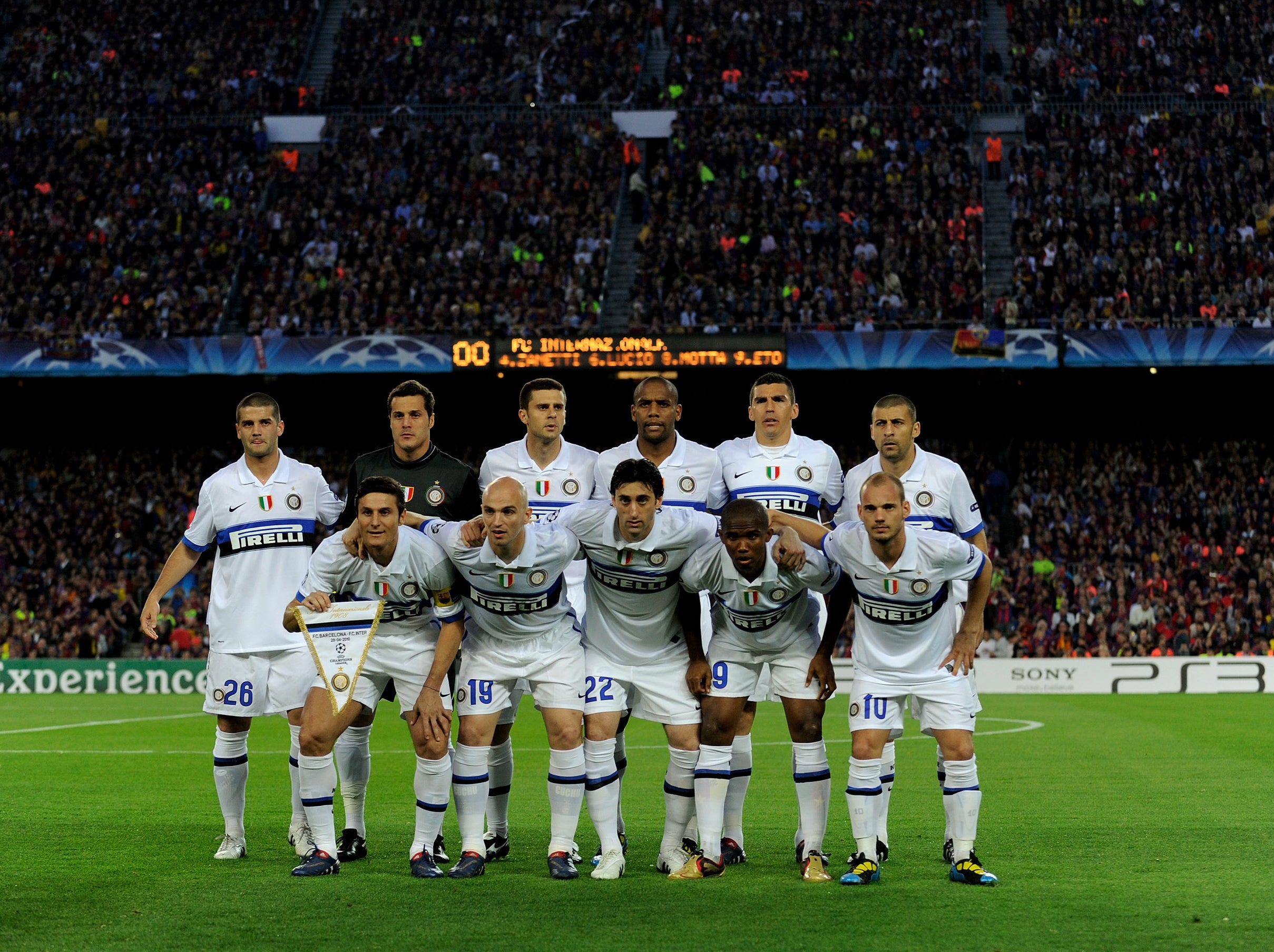
He might well have touched on something with Guardiola, who grew up a Barca obsessive just accustomed to the European Cup being Madrid’s. The point, however, was to crank the current Barca team up so much they didn’t play their normal game. And that was what Guardiola was emphasising in the dressing room: “Be faithful to the style. Come out fast.”
He wasn’t quite faithful to himself, though. Guardiola had again considered leaving Ibrahimovic out, for Messi to play as the false nine. Guardiola again relented.
The Swede was there in the centre again, as the storm rose. The Barca anthem was belted out.
“You could feel the atmosphere of the stadium,” Bojan says. “The fans had been there hours. It was a match of special characteristics.”
And initially a match that started entirely as expected: Barca probing, Inter frustrating, all of that within 25m of Julio Cesar’s goal. That did actually suit Ibrahimovic more, and he was performing better, more involved. A sign of the battle came in the 10th minute when the Swede got up from the turf after a tussle with Lucio, and pointed to his ripped shirt.
Referee Frank de Bleeckere still didn’t point to the spot.
Moments later, Maicon careered into an advertising hoarding after contesting a ball with Messi. It was the second time in the tie he had to receive significant treatment. These were the levels.
Inter’s approach had already been further conditioned in the moments before kick-off, when Goran Pandev got injured and had to be replaced at left-wing by left-back Christian Chivu. If this naturally made them more defensive, the infamous moment in the 26th minute completed that job, and really detonated the game.
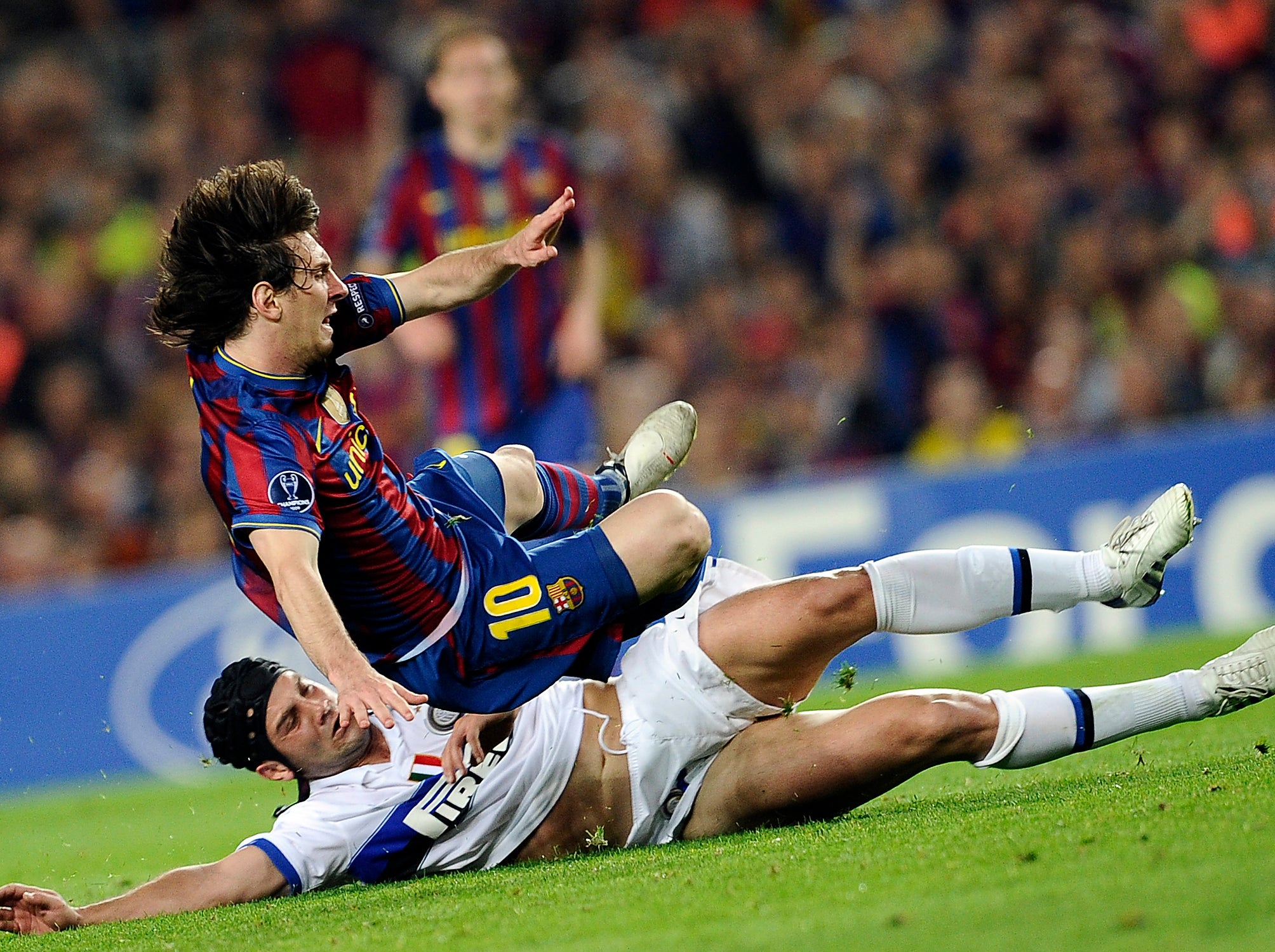
Thiago Motta did swipe out at Busquets face, but the player acted like he’d been blinded, before so notoriously peeking through his fingers to see if the Inter midfielder would be punished. He was. Motta was sent-off. It was the greatest impudence, all the more so because Motta himself had warned of this before the game.
“We’re used to seeing the Barca players throwing themselves to the ground a lot. The important is to play clean.”
But he didn’t, and it was a case of two wrongs leading to a right. And maybe the right thing for Inter, too.
They went right down to that purity of performance that only extremes can bring. Mourinho, having made such a show of theatrically laughing at the decision, still had the presence of mind to quickly go full defence. Chivu was moved inside, Milito to the left, and Eto’o to the right. There was no striker. There was only will.
“We had to go deep and find our strength,” Milito explains.
“It conditioned them to go even further back,” Bojan says.
As Guardiola attempted his own reshuffle and beckoned Ibrahimovic over, Mourinho couldn’t resist going up to them.
“You think it’s all over, but it’s not,” he quipped.
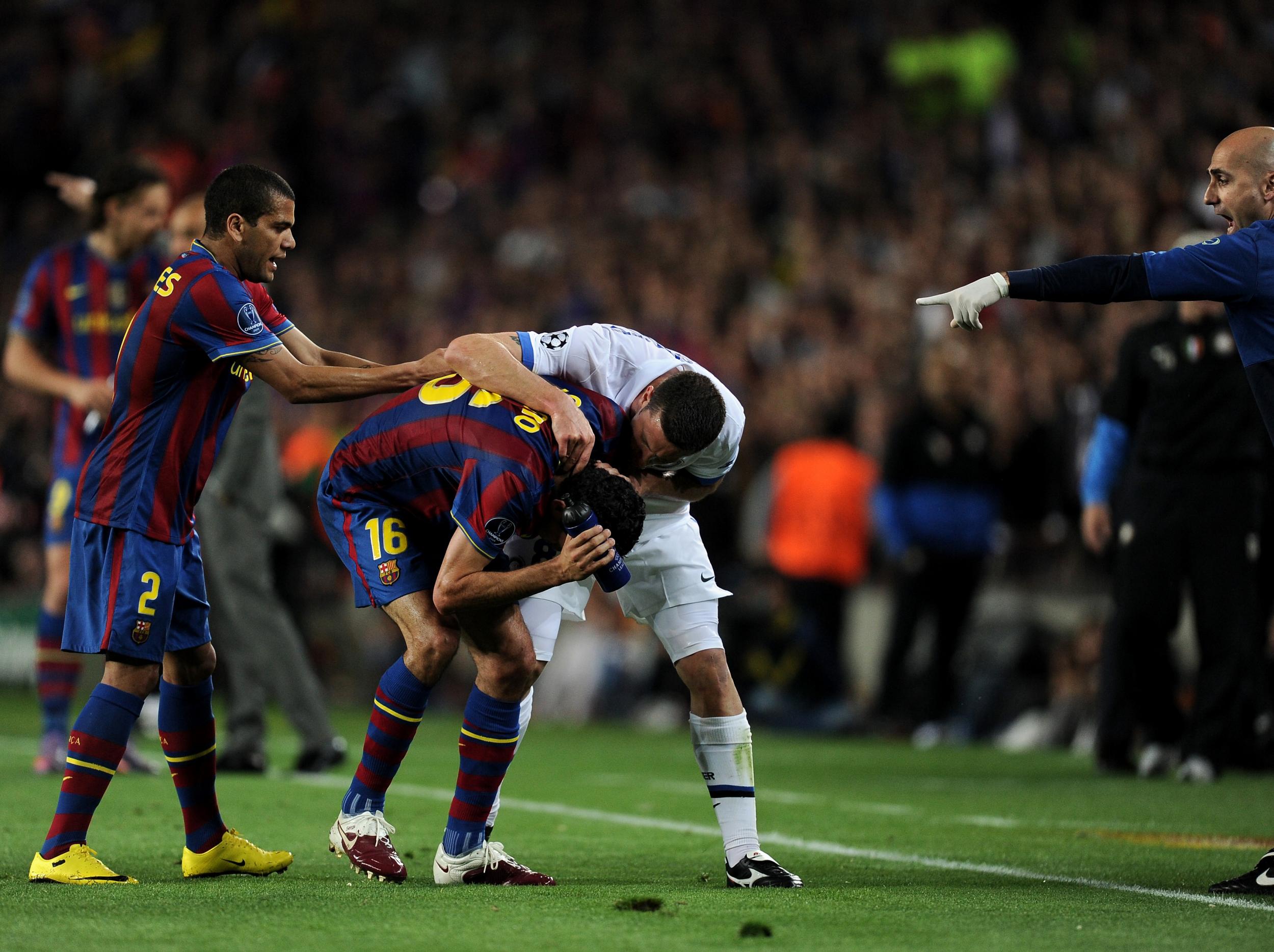
It was only beginning.
***
The great problem for Barcelona, and great virtue of Mourinho’s psychological management, was that Inter’s defending was so focused – both positionally and mentally – that there just wasn’t even an inch of space around their box. The absence of Iniesta was never more telling. There just wasn’t an opening for their quick movement or overlaps, or angle to play that classic Barca pass from central midfield to an oncoming wide player.
Every route was closed off, usually by the kind of classically Italian defending where just getting anything on the ball seemed to be mean everything. This was symbolised by one full-bodied Samuel block on a close-range Ibrahimovic shot in the 38th minute.
“They were just creating so many lines of defence,” Pedro tells The Independent now. “Eto’o was playing as a full-back. I remember coming across lines of five, six… it was so difficult to find space.”
Julio Cesar had by then already been cautioned for time-wasting. They even left the Barcelona players on the pitch for what seemed like an age after the half-time break.
This was the greater challenge for Barca. They game was one of those battles against time as much as the opposition, with the challenge of having to remain patient but yet counter-intuitively needing to up the tempo to get to certain points by certain stages. They first had to just get a goal.
The pressure, the atmosphere, was immense.
“We felt that weight all game,” Pedro explains.
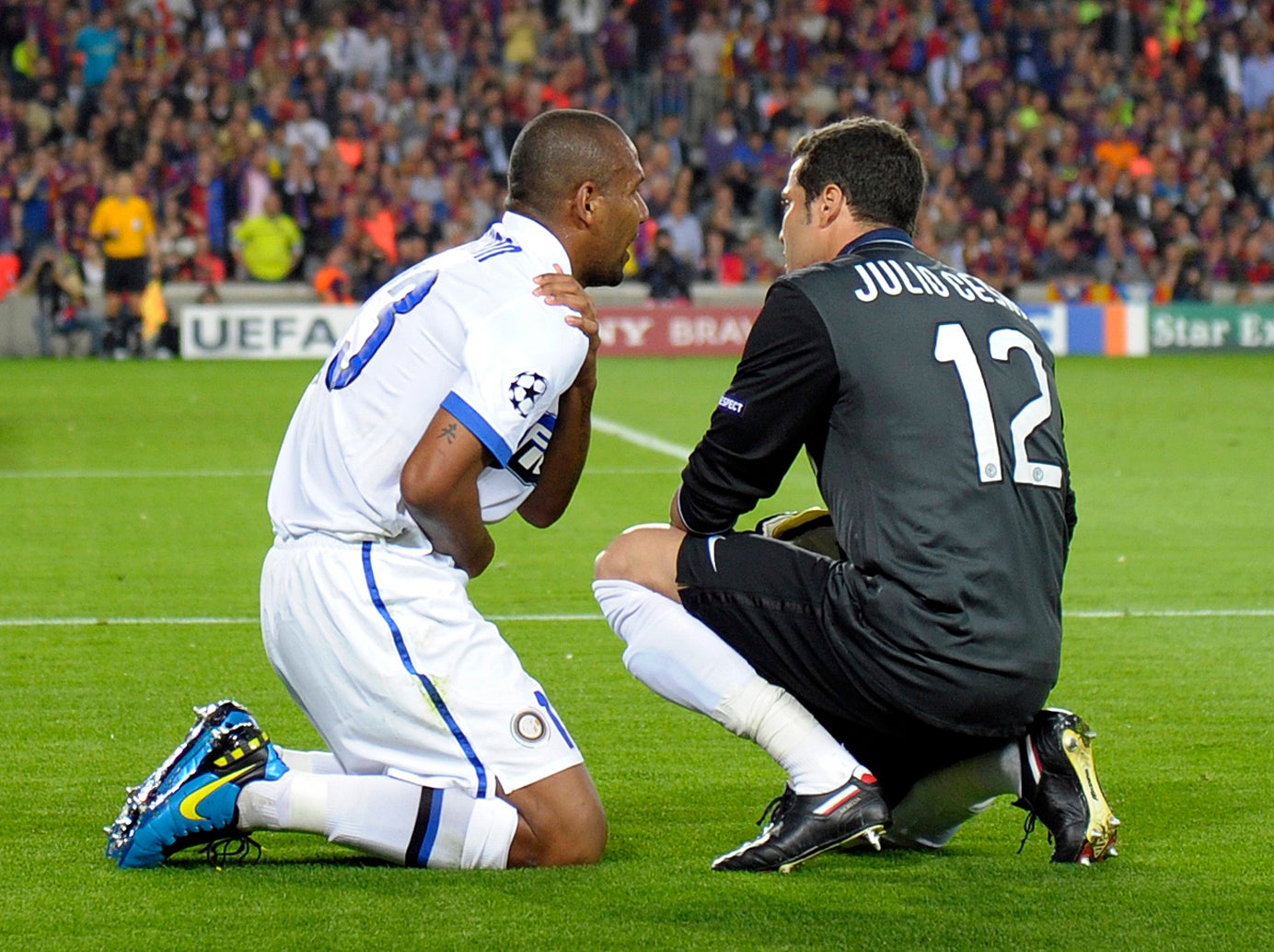
It was in itself an ingenious piece of counter-intuitive thinking by Mourinho, judo-like. Barcelona prize the ball, so give it to them, and use that against them.
“We didn’t want the ball because when Barcelona press and win the ball back, we lose our position,” Mourinho said. “I never want to lose position on the pitch so I didn’t want us to have the ball. We gave it away.
“I told my players that we could let the ball help us win and that we had to be compact, closing spaces.”
There had been a slight crack shortly before half-time, when Messi suddenly broke free and burst across the box, before unleashing a shot that Cesar just touched away.
This was that challenge again. This was the warning for Inter.
This just caused them to squeeze the space even further. Barca were always trying to open a phalanx of 10 players. Xavi referred to them “hanging off the crossbar”.
Maicon went on to describe it as “suffering”, but whether that meant they hated their jobs in the manner Pique desired is another matter. There was that exhilaration that comes from the deepest reserves of effort.
Inter by that point had just 19% possession. Their rare touches, however, were enough. Guardiola again had seen enough. Ibrahimovic was brought off along with Busquets, and Bojan and Jeffren were brought on.
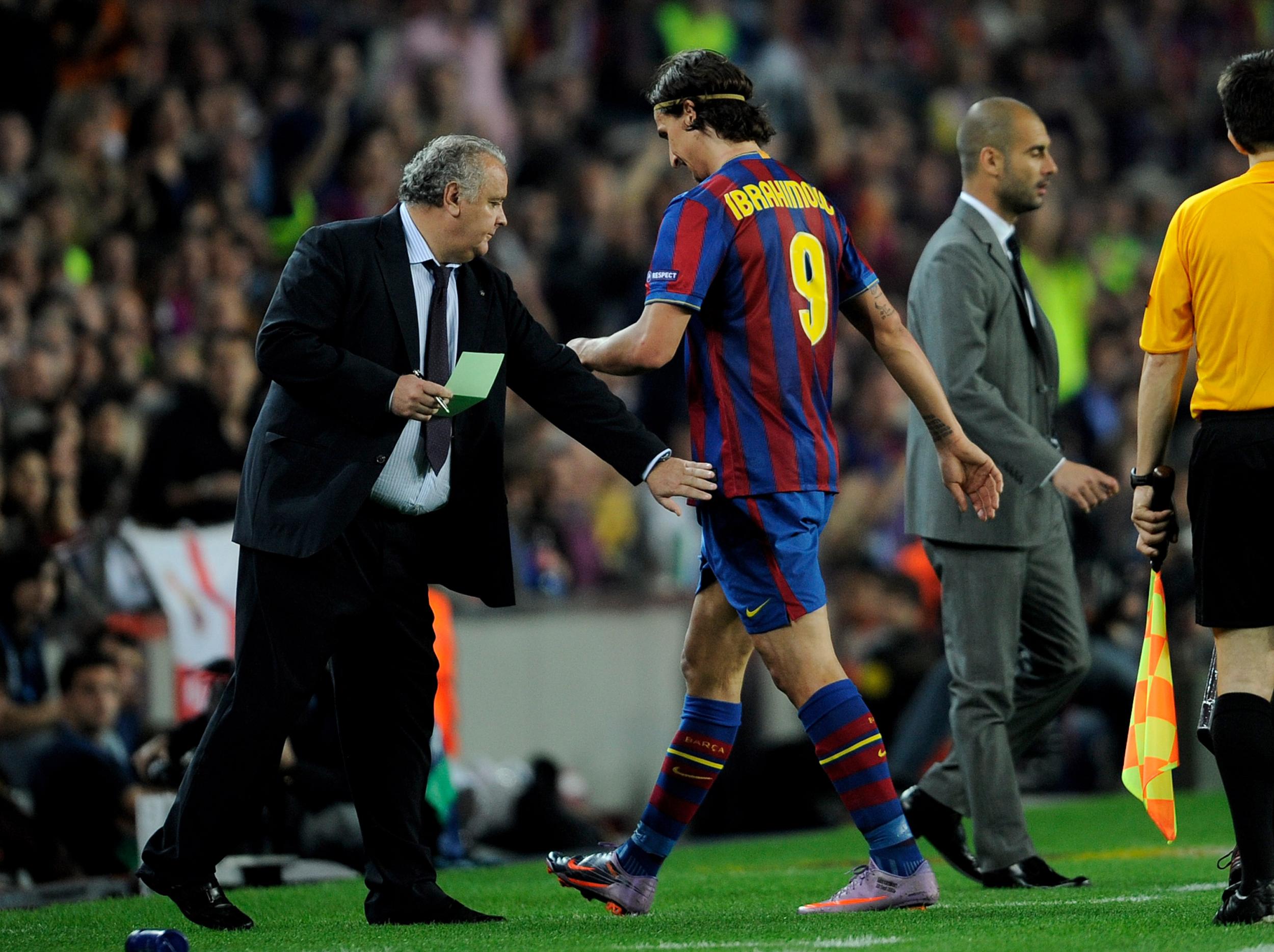
“In matches like this, there’s such tension you’re already so involved in the game,” Bojan says. “Pep just wanted to me to get in the area.”
And move. The increase of small nimble players, combined with Inter’s growing fatigue, gradually began to bring cracks.
On 83 minutes, Messi found sufficient space to clip in a fine cross for Bojan, only for the forward to head it wide.
On 84, Barcelona got that first goal back. It came from Pique having been moved up front, but not from any battering-ram tactics. It was from the most nimble of footwork. Xavi finally found the space to play one of those passes and, with Julio Cesar coming out and substitute Ivan Cordoba coming from behind, Pique deftly turned with two touches. It left the two Inter players looking the wrong way and the goal open.
3-2 on aggregate. Barcelona needed one more to win on away goals.
The roar said enough. This was the grandstand finish. This was when the pressure was at its most intense, when everything about the game, and the competition, and the teams, was distilled into one defining spell.
This was the purest level of Champions League football.
But the purest level of drama was still to come.
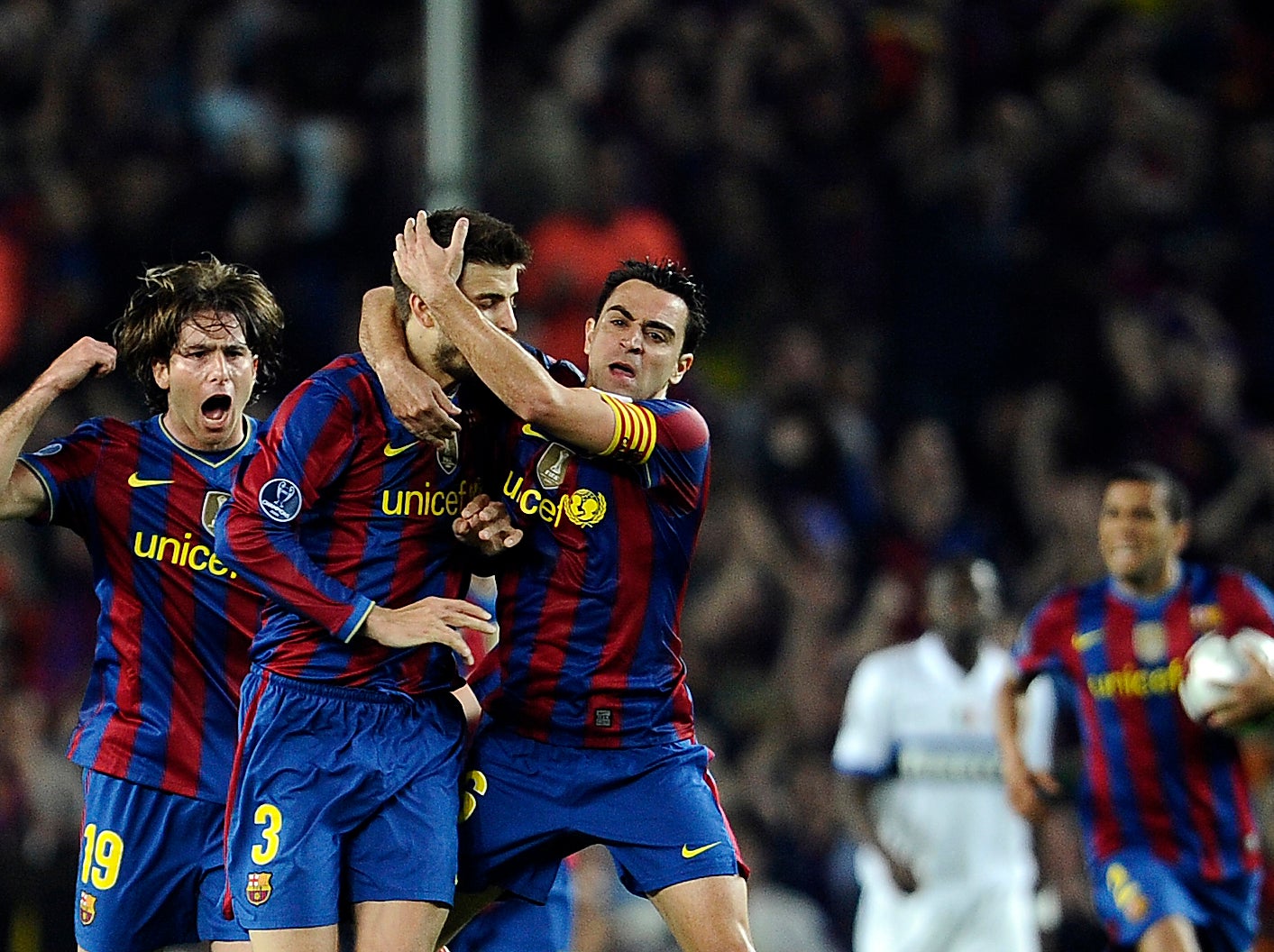
Both Xavi and Messi tested Cesar with precise shots that reflected the intense focus of the moment. There was not a single moment for the slightest error.
In stoppage time, with Inter entirely pegged back into their box, Yaya Toure charged down another attempted clearance. It found its way to Bojan, who struck. The way the ball soared into the very top corner seemed to symbolise the release and relief the Camp Now felt, as Bojan and his teammates careered away in celebration.
Until they were hauled back.
The ball was adjudged to have struck Toure’s arm. It was still 1-0. Inter were still going to Madrid.
“Bojan is the only player that almost killed me with a heart attack,” Mourinho would later say.
The game was killed. That was it. Appropriately, the last action was Inter hacking the ball away.
Full-time.
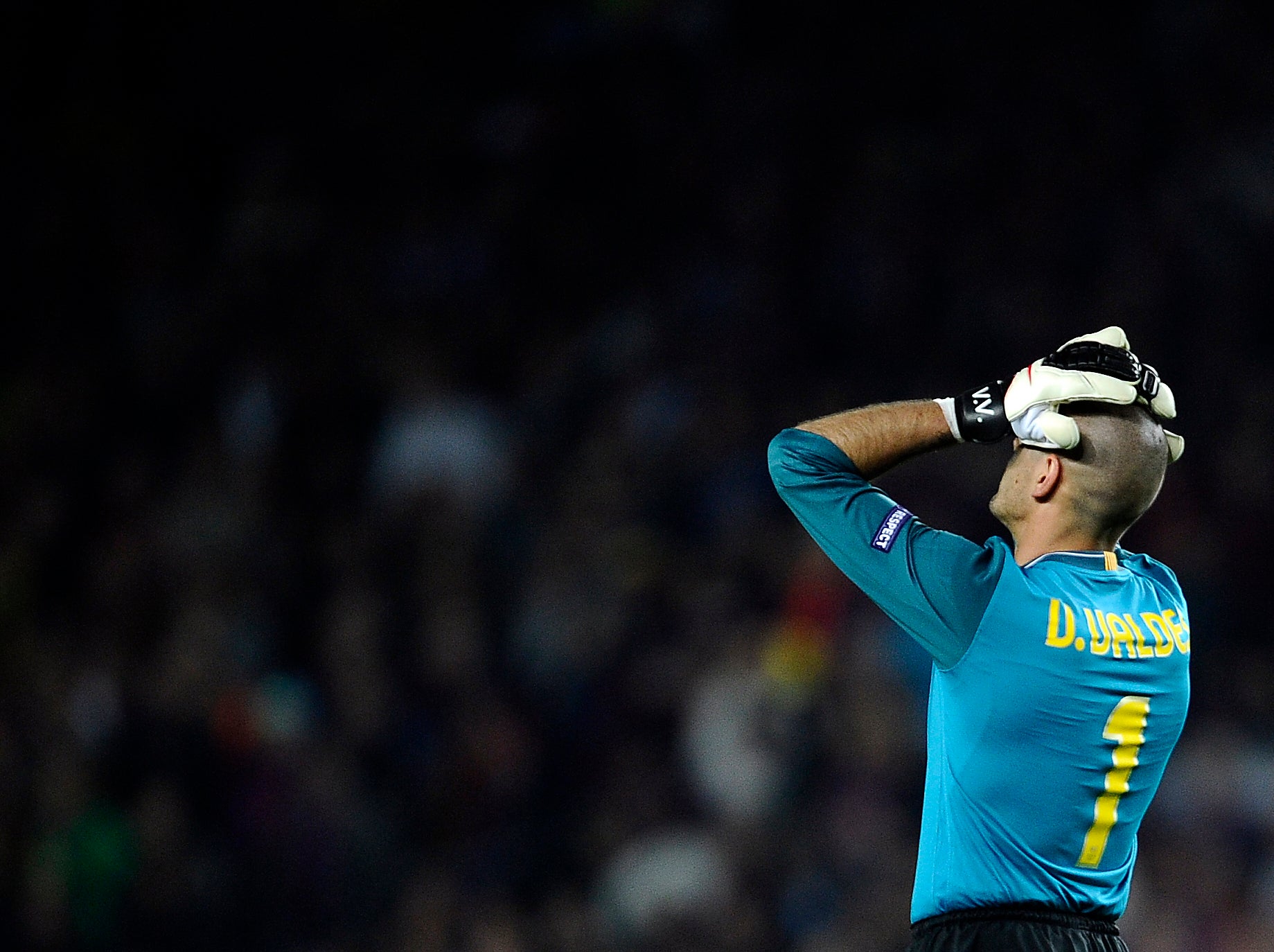
Barca players sank to the ground in despair, Inter players sank to the ground in exhausted exhilaration. Mourinho meanwhile ran manically towards the Inter supporters at the very top of the Camp Nou, pointing to the sky.
Valdes bizarrely tried to restrain him and the pitch sprinklers came on – but there was no stopping him. Still “in the moment”, Mourinho told the media his players were “a team of heroes”, and spoke in almost viking terminology.
“When the moment of leaving everything on the pitch arrives, you don’t leave the skill, you leave the blood.”
He also described it as “the most beautiful defeat of his career”.
As all this was going on, there was only “silence” in the Barcelona dressing room. Guardiola was as forlornly introspective as anyone, running over everything that happened in his head.
“Nobody spoke,” Bojan says. “This wasn’t the time for any kind of team talk.”
It was Mourinho’s time.
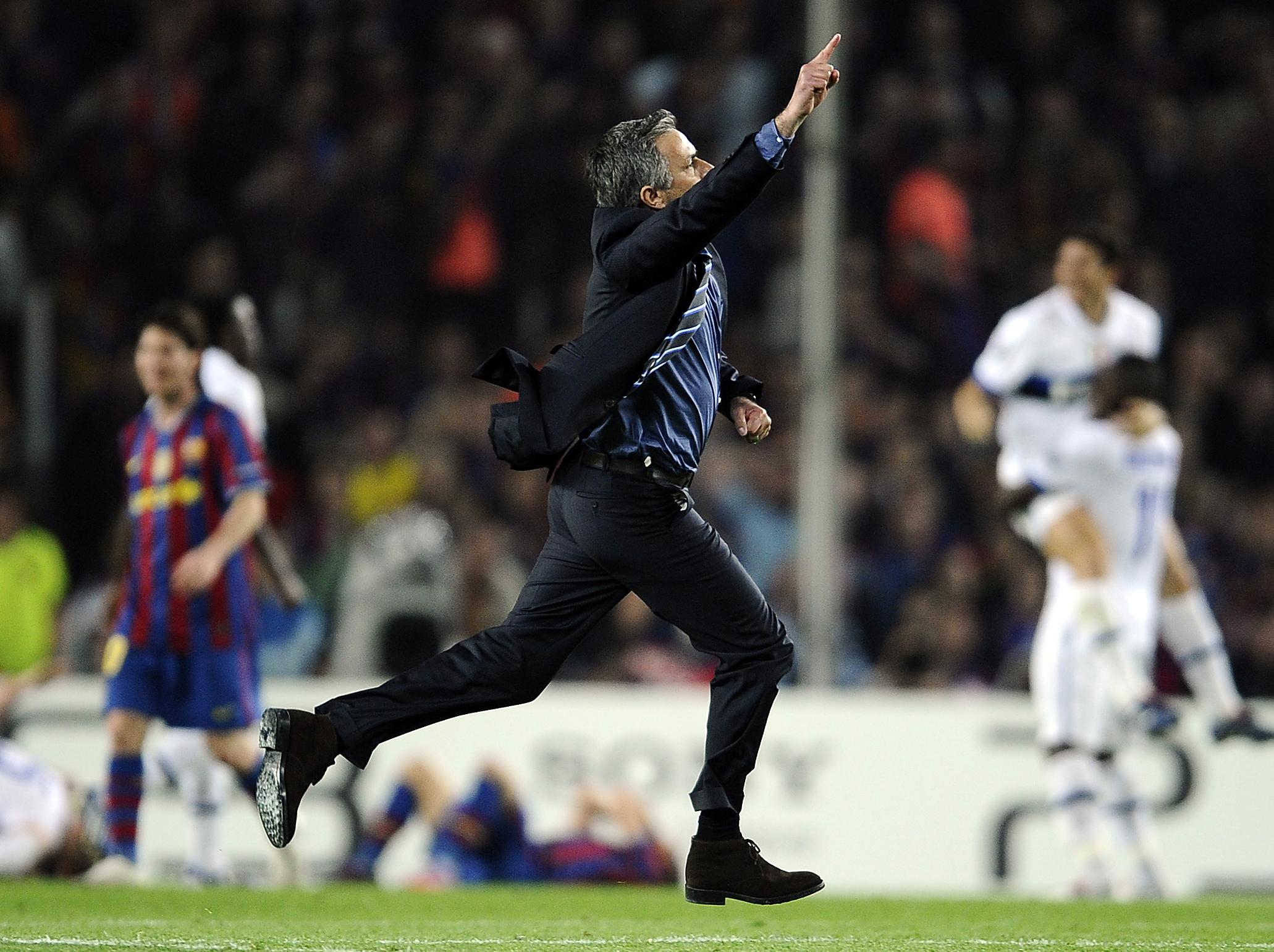
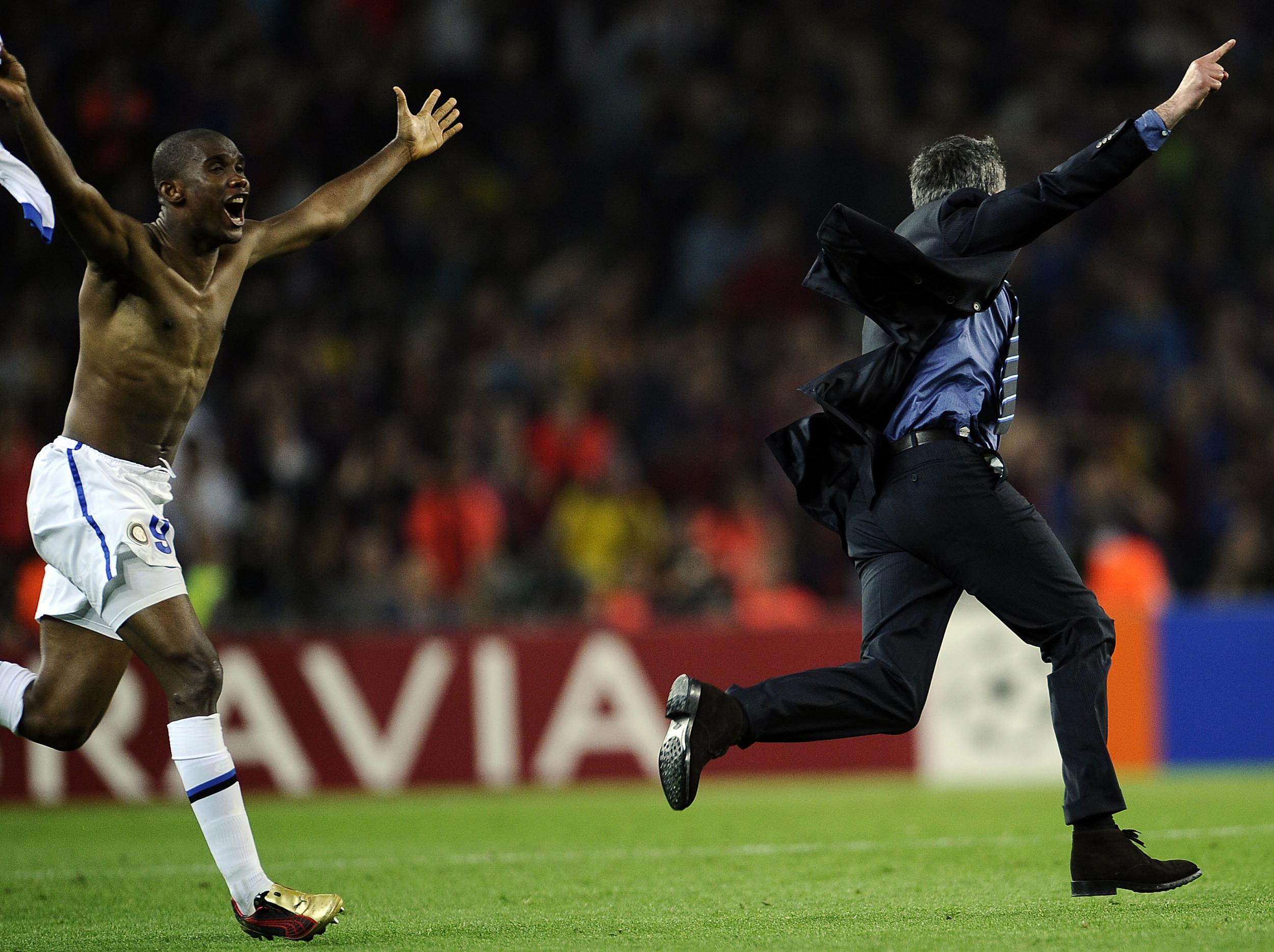
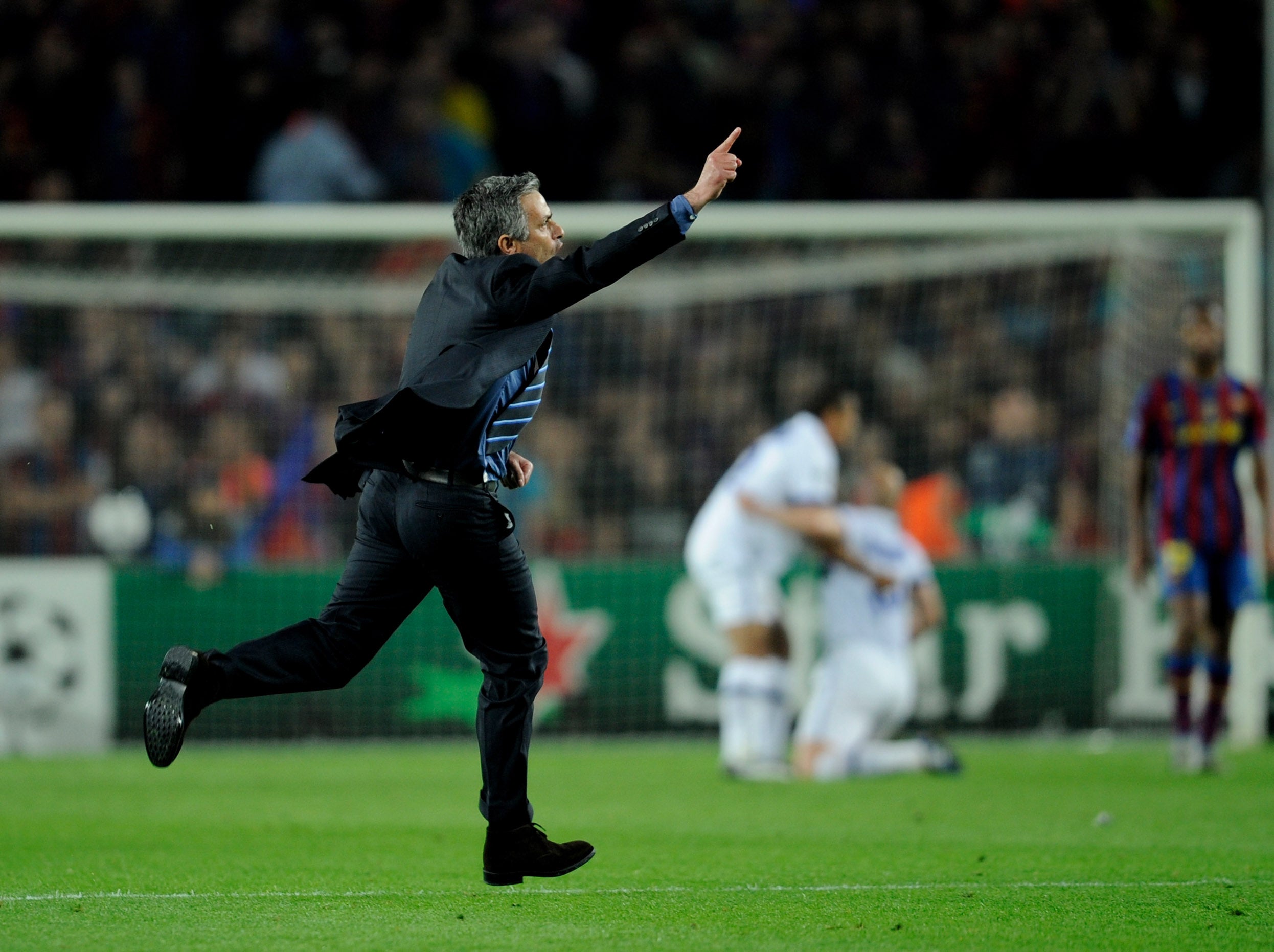
***
When Mourinho eventually went to Real Madrid that summer, the image he picked to decorate his new office was not one from the victorious 2-0 win over Bayern Munich in the Bernabeu, or any other trophy-lifting moment. It was him running and pointing to the sky in the Camp Nou, which he had made into a life-size cut-out.
It reflected the game’s status as his favourite career moment. It was why he got the job at Madrid. Bernabeu president Florentino Perez immediately closed the deal, convinced of Mourinho’s transcendent genius.
But, brilliant as it was, it didn’t quite occur to Perez how much had gone in Inter’s favour to facilitate that win.
To actually stop Barca, it ultimately took a volcano, an injury to one of the greatest players ever in Iniesta, a rare bad tactical decision from Guardiola, a number of hugely questionable refereeing decisions including one blatant call over handball in the last minute and – yes – a whole lot of luck.
These were the fine margins behind such a seismic result. This was what Guardiola was so intensely mulling over in the dressing room after the game. It was pretty much there and then that he decided he himself had to take the hard decision to discard Ibrahimovic and bring in a much more suitable forward in David Villa.
Messi would meanwhile be finally moved into the centre, signalling his last great ascension as a player.
The effect of this could be most resoundingly seen in the next meeting between Mourinho and Barcelona, when Real Madrid were utterly thrashed 5-0 in one of those signature performances.
It illustrated why, although Mourinho was pointing to the sky that night, the only way was down. It was why that victory was not just a last hurrah for that Inter team, but also a last hurrah for that style of football.
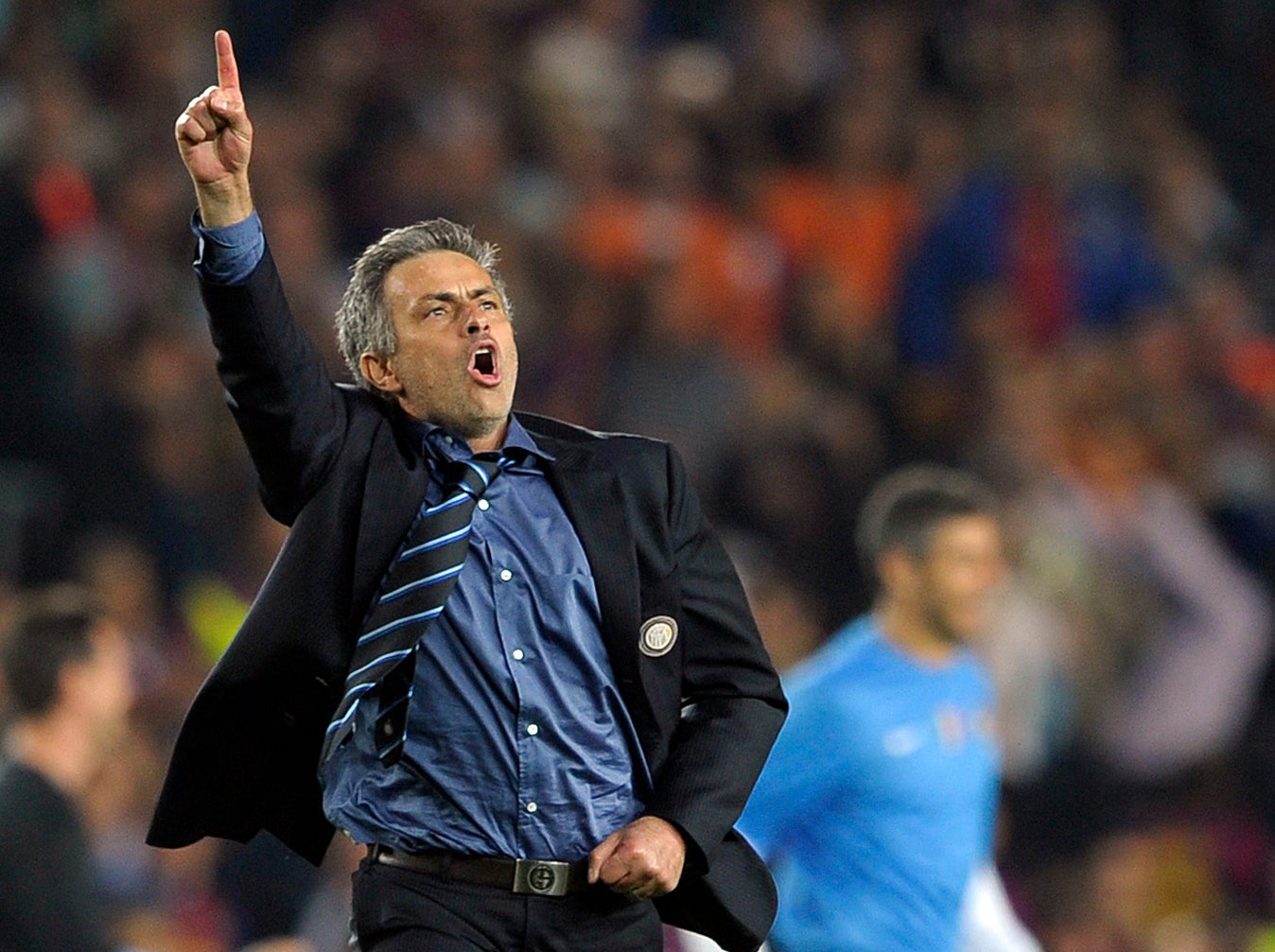
This was one reason the game was so historically compelling. It was one philosophy on the rise, one on the decline, but just meeting at the perfect point for conflict and combustion.
It also meant it was a wholly imperfect time for Mourinho to be going to Madrid with a God complex.
That was because he was going to a club who weren’t discards, but authoritative champions in their own right. A club which did not look up to him. They also saw his football as beneath them.
The reality was that the sport was already being taken over by one of the most profound evolutions in the game, which was started by Guardiola.
The Inter result would offer the final resolve to really complete this Barcelona team, and offer their most complete performance: the 3-1 Champions League final win over Manchester United in 2011.
They may not have achieved the gold-standard of three European Cups in a row, but they did achieve a gold-standard display that had far greater influence.
It is why Pedro isn’t so down about the failure of 2010, nine years on.
“I think Barcelona has that status as the best ever. For everything, for the players, the best player in the world, and a philosophy and idea of play very clear.”
And part of it came from one of the greatest ever ties.
Join our commenting forum
Join thought-provoking conversations, follow other Independent readers and see their replies
Comments
Bookmark popover
Removed from bookmarks